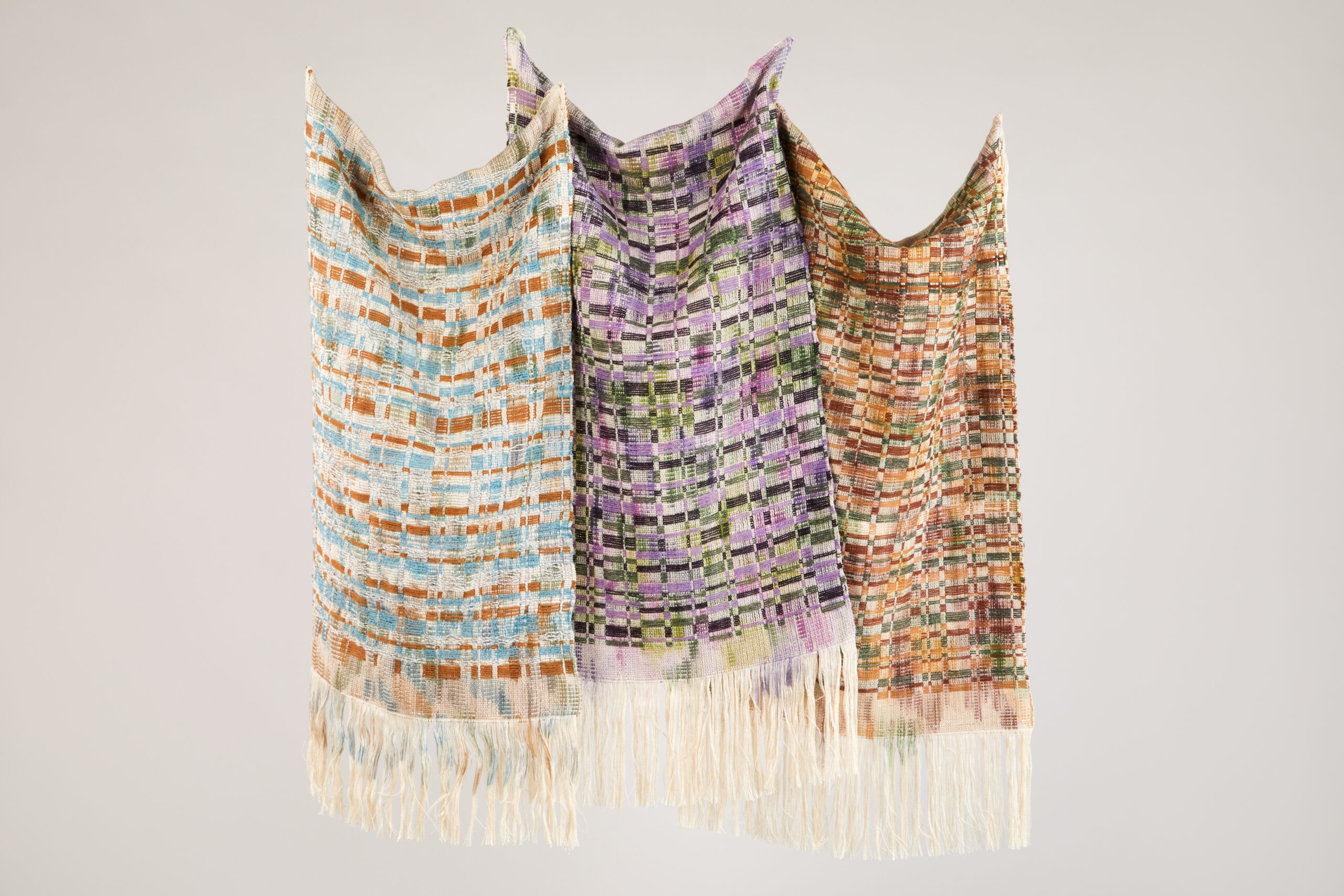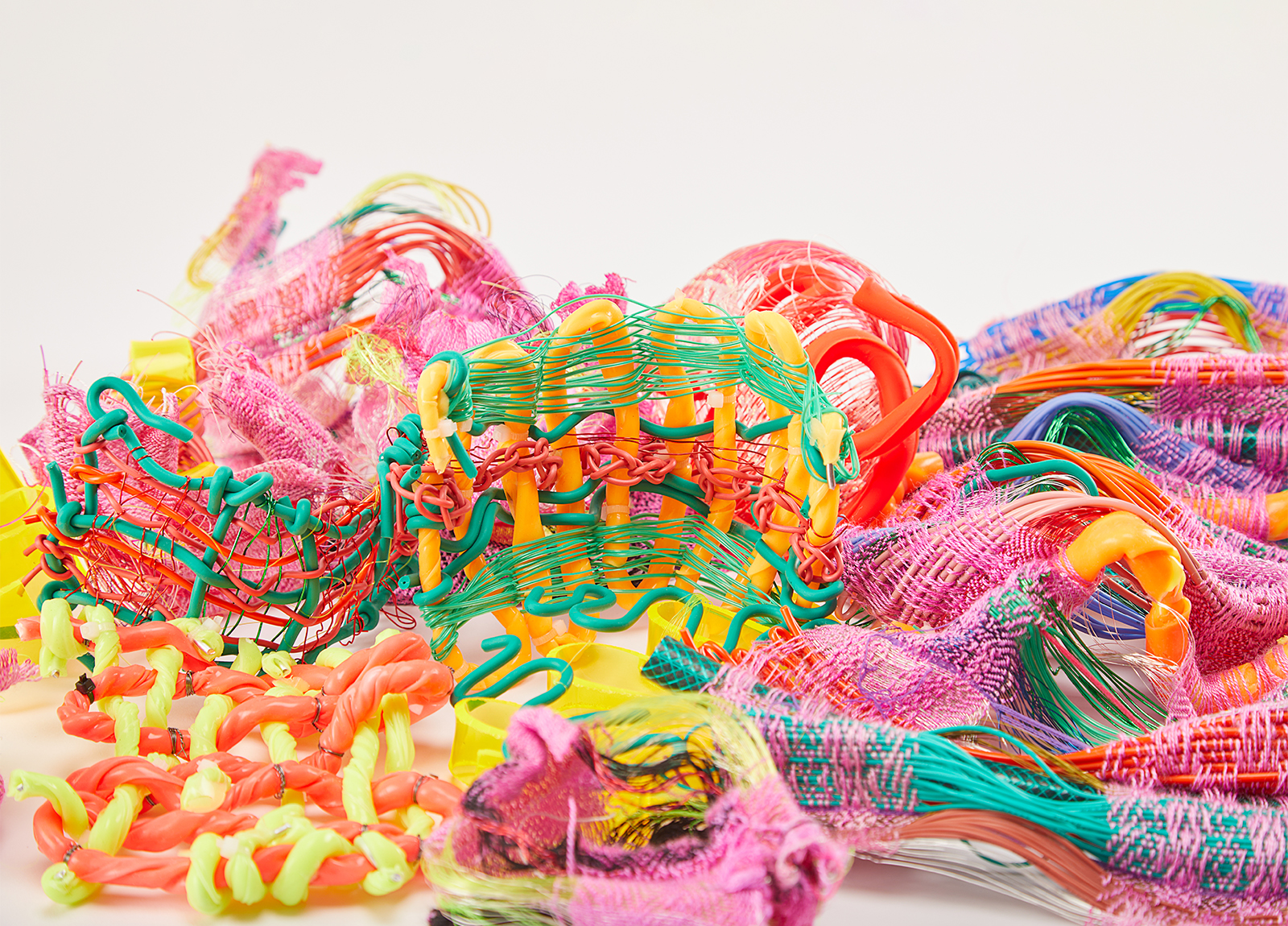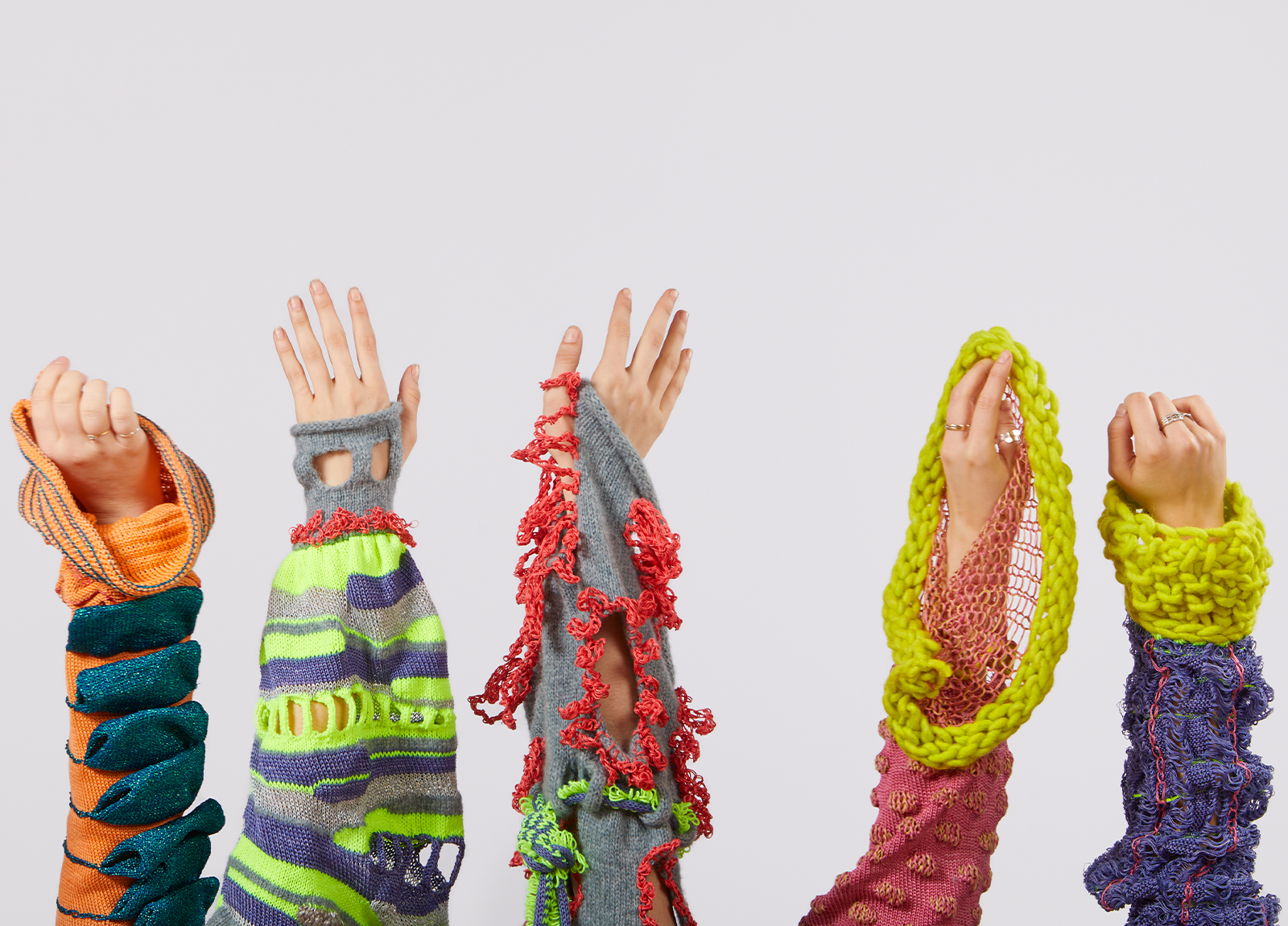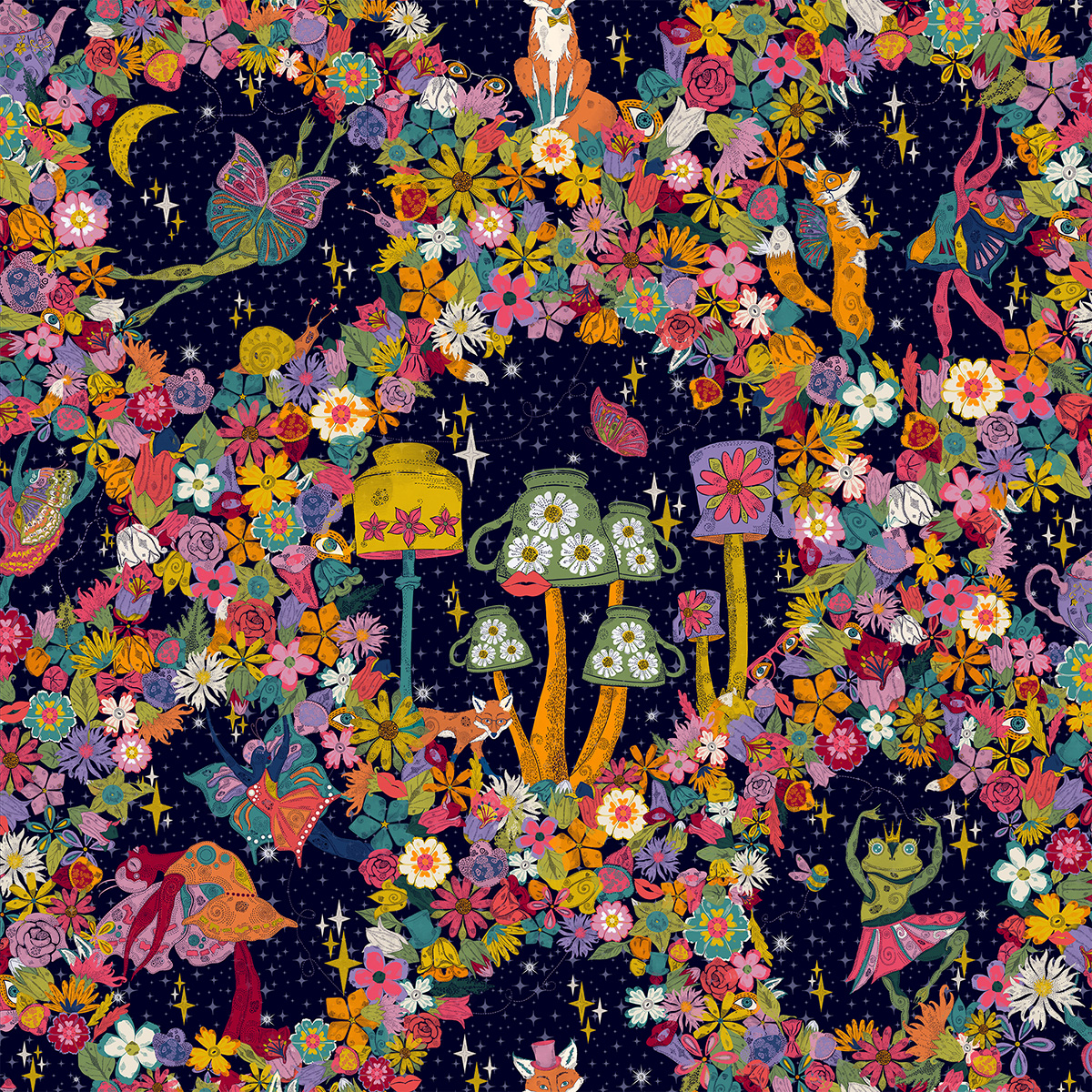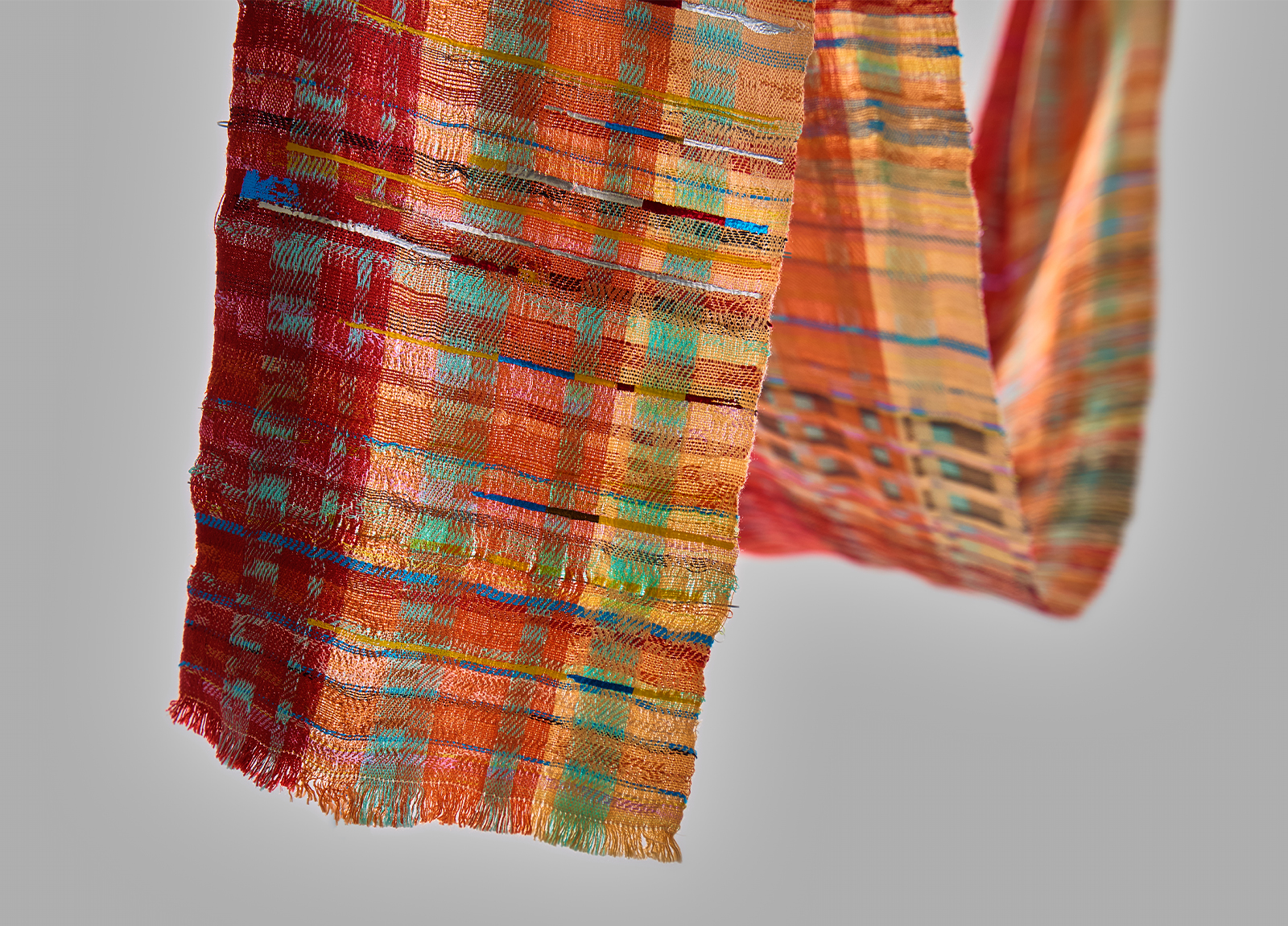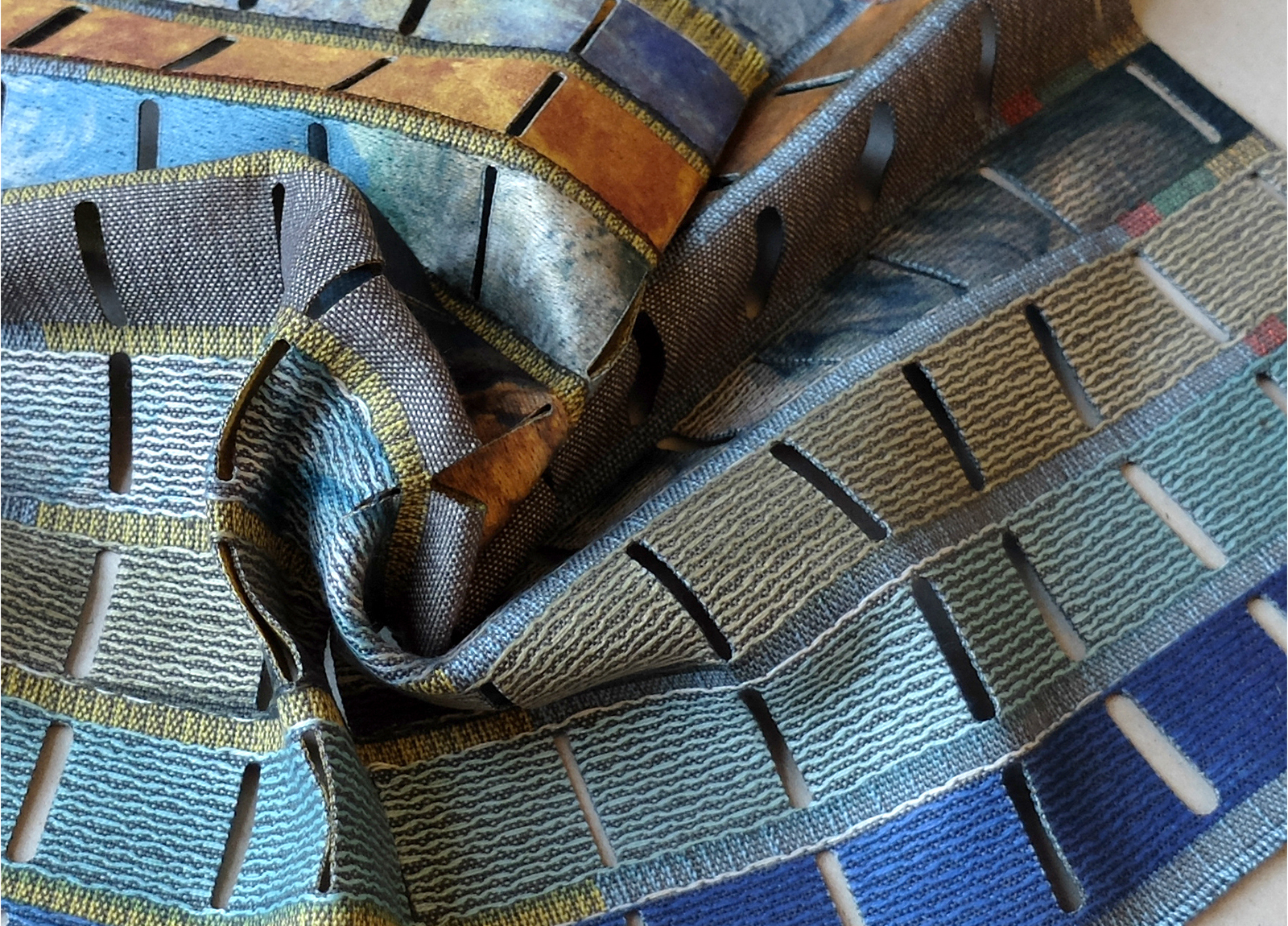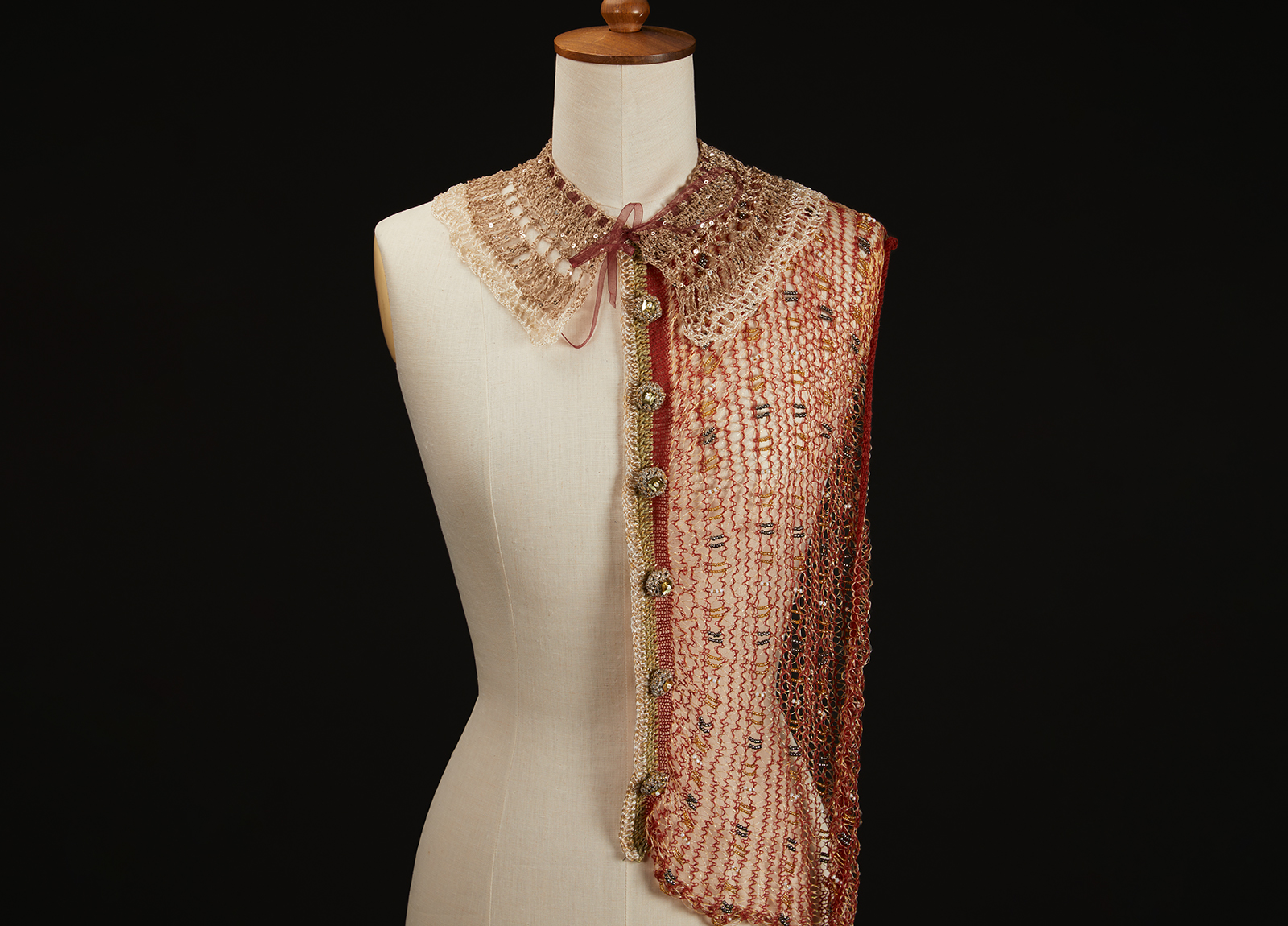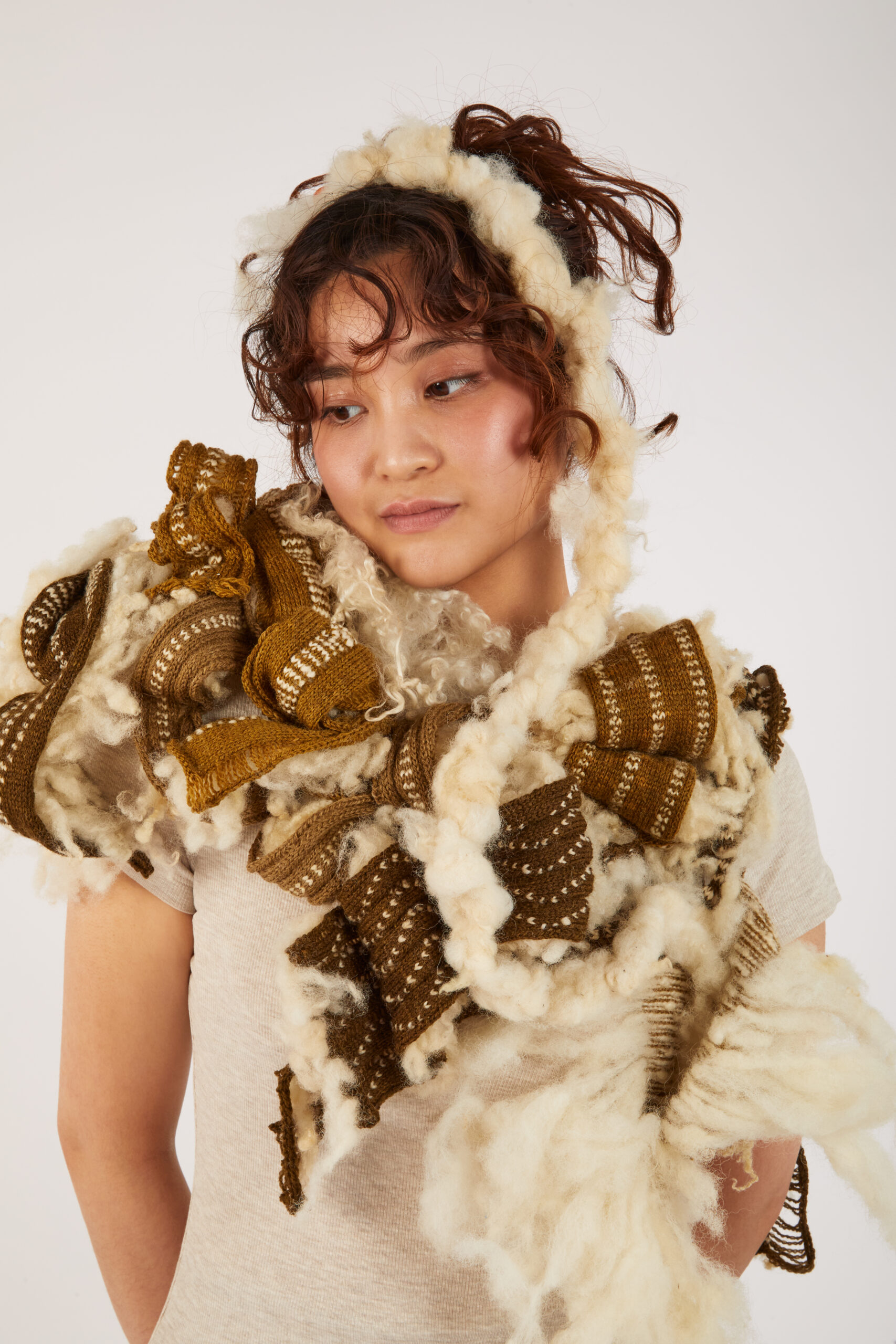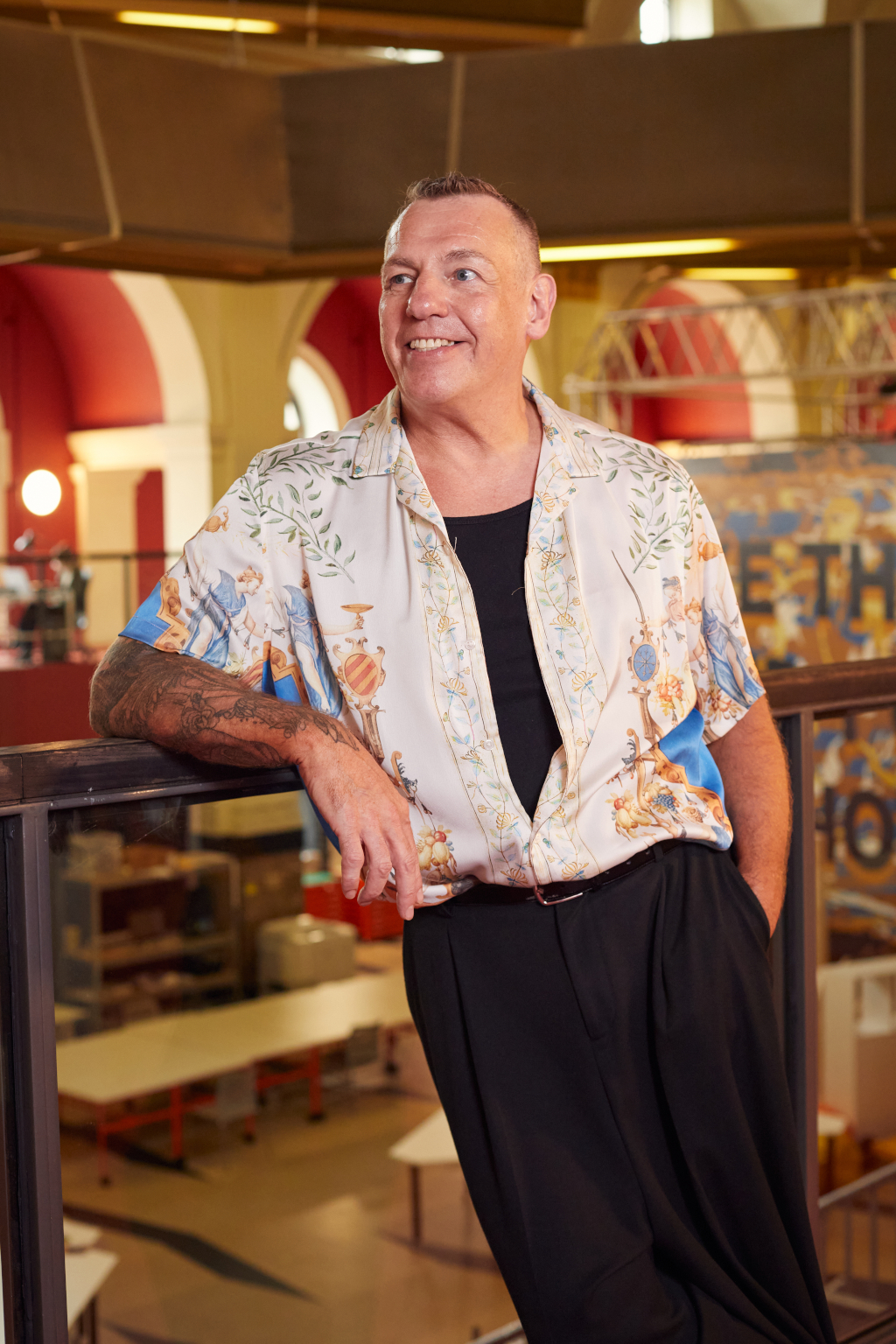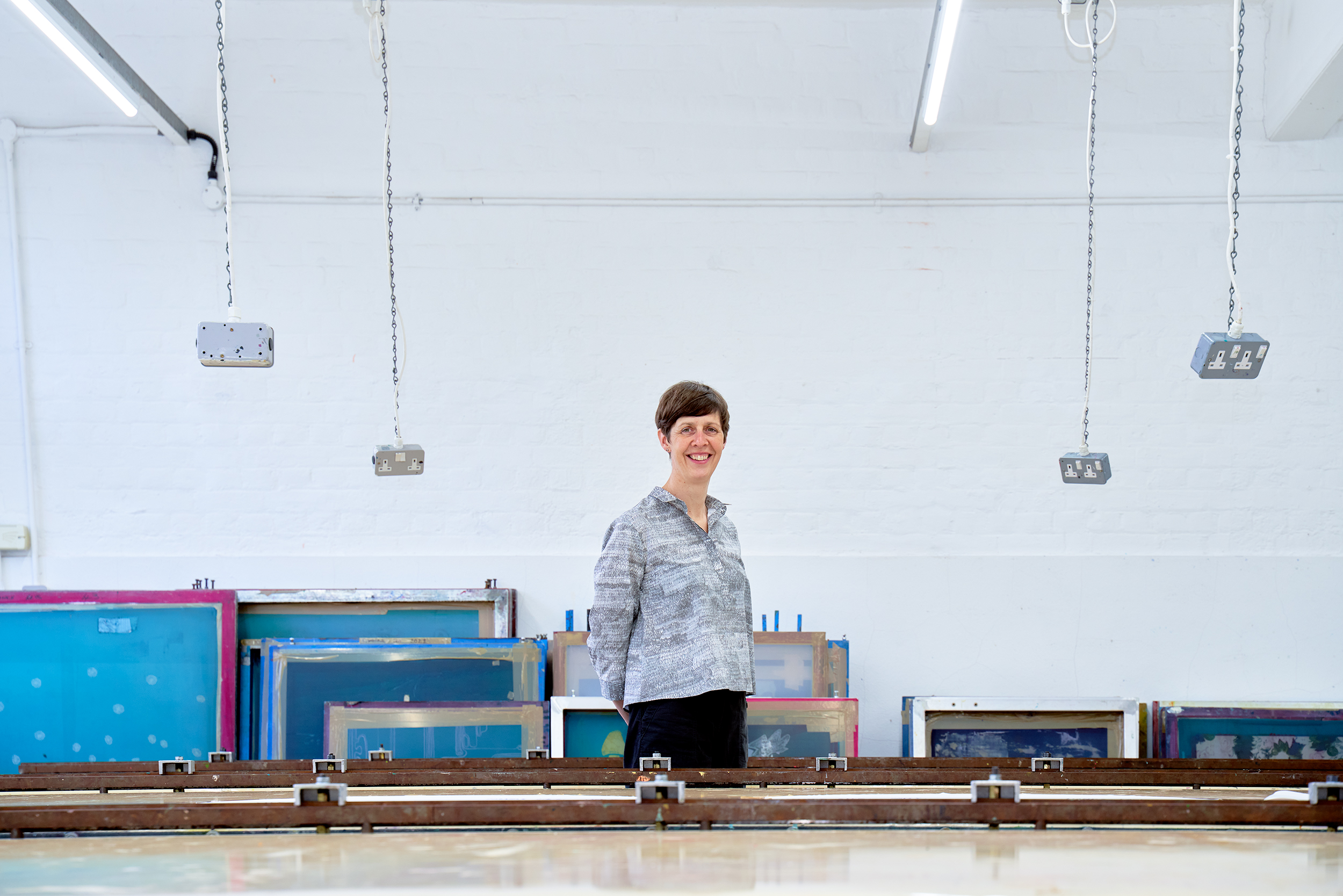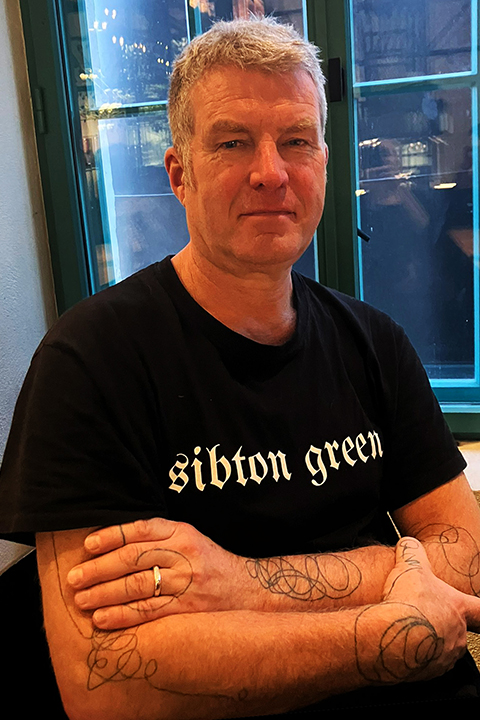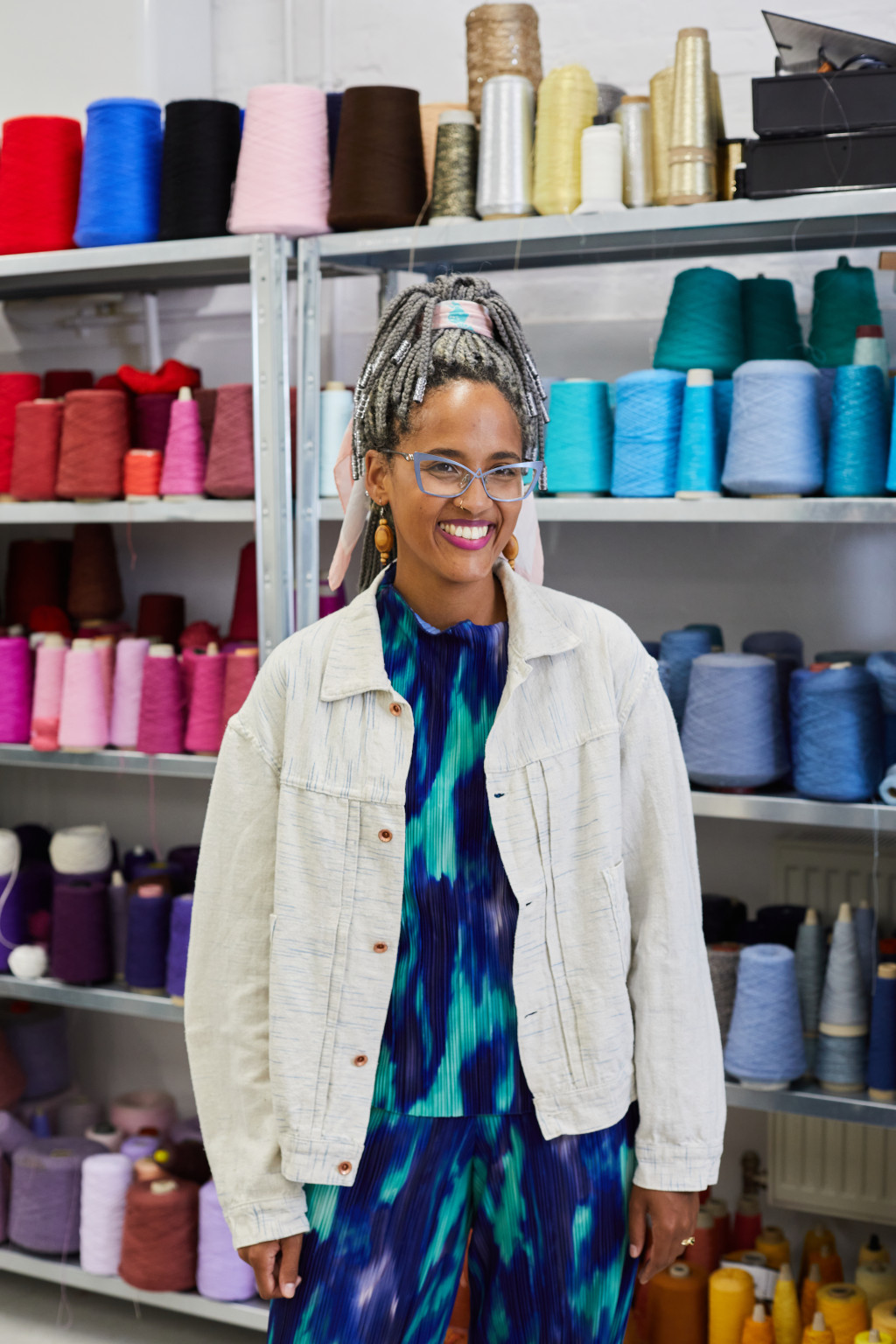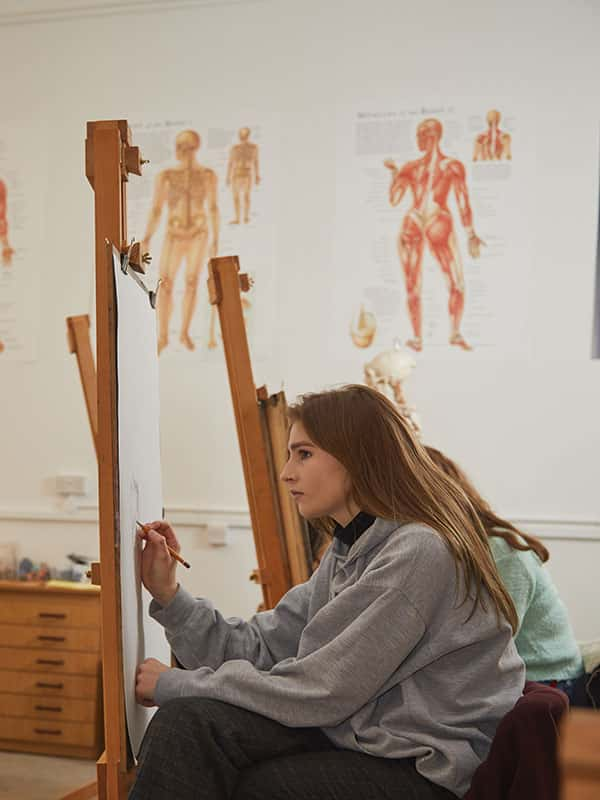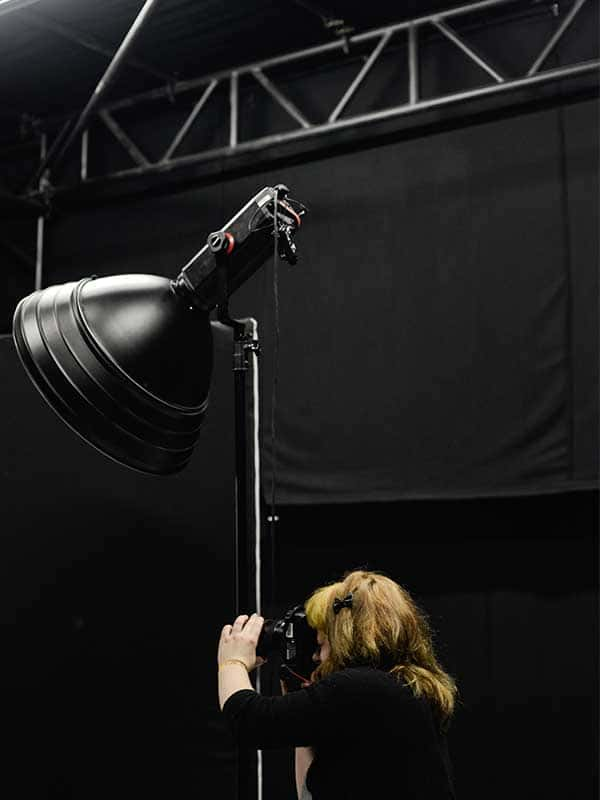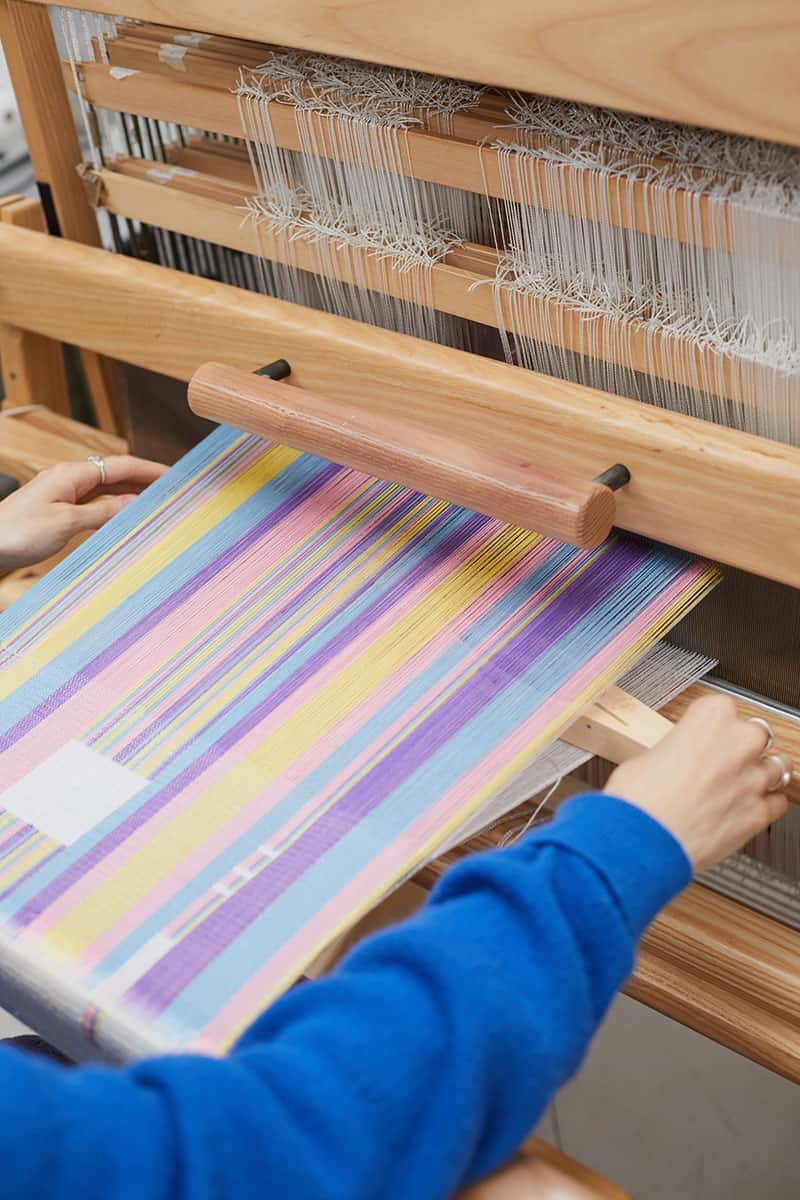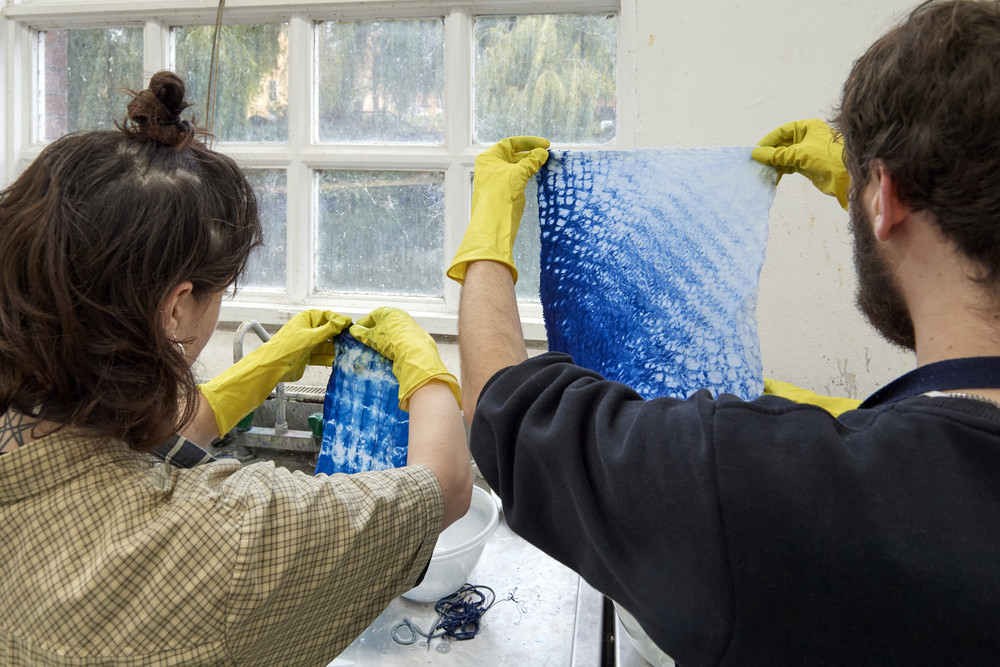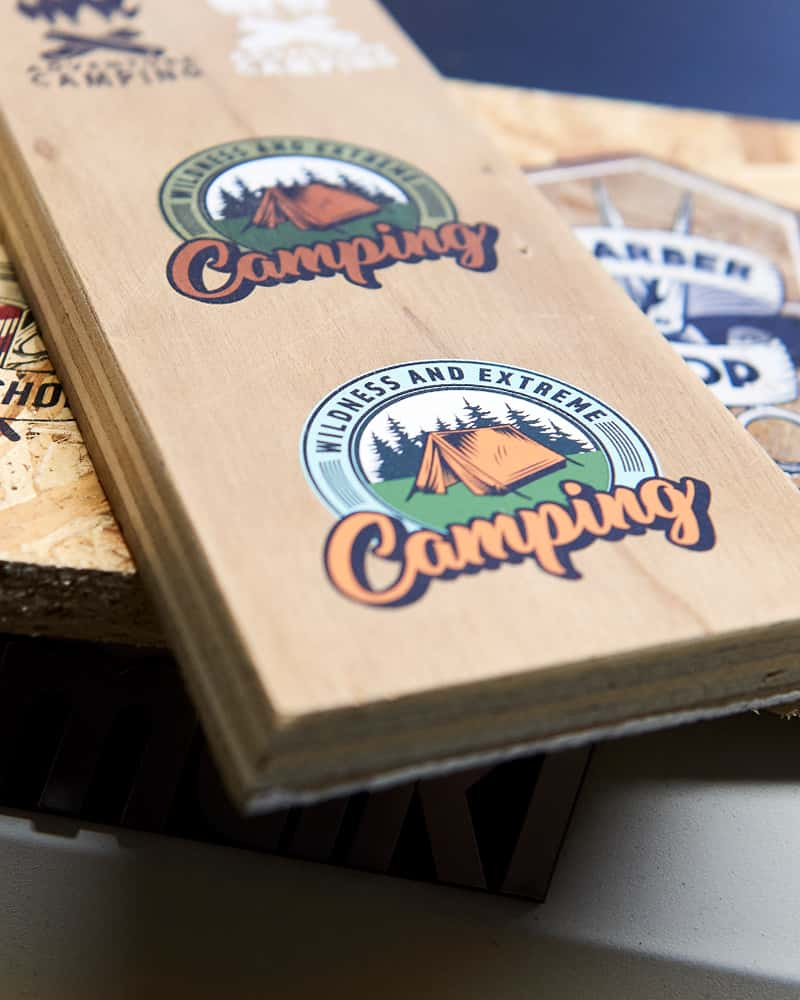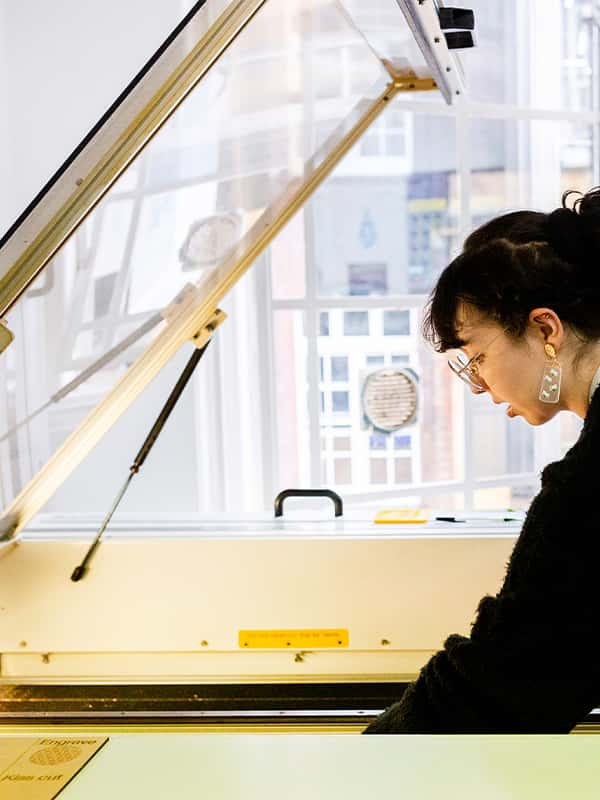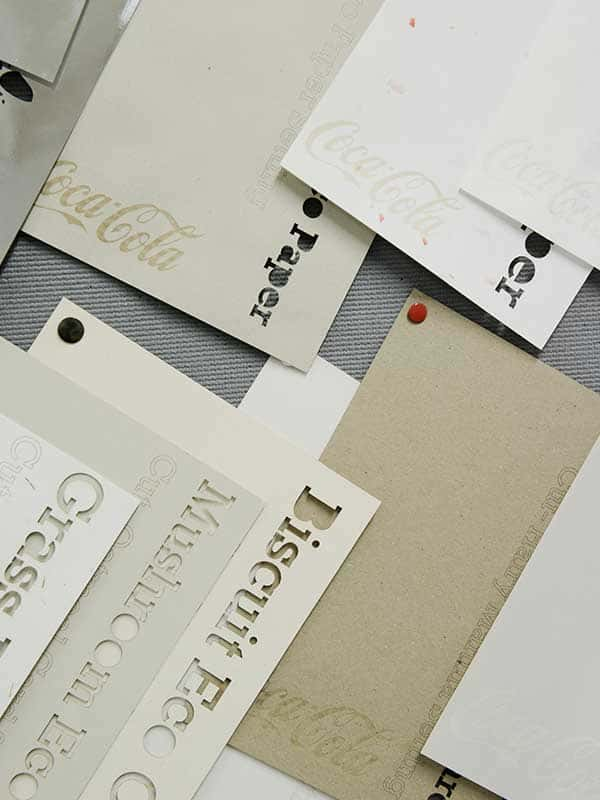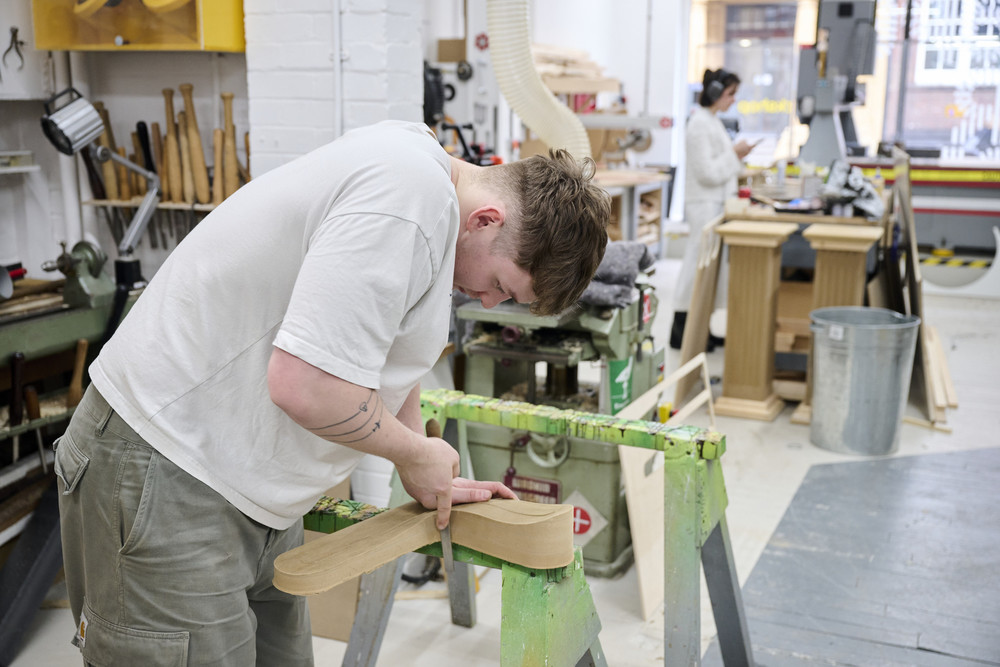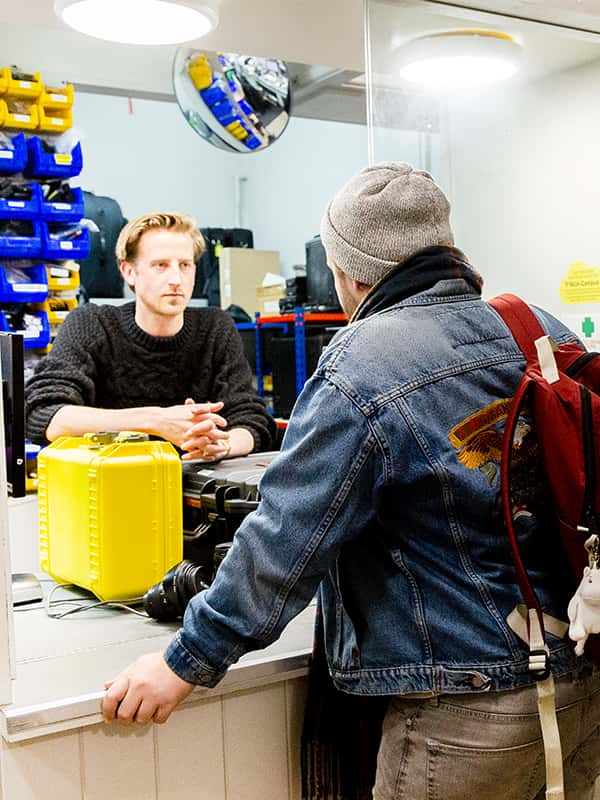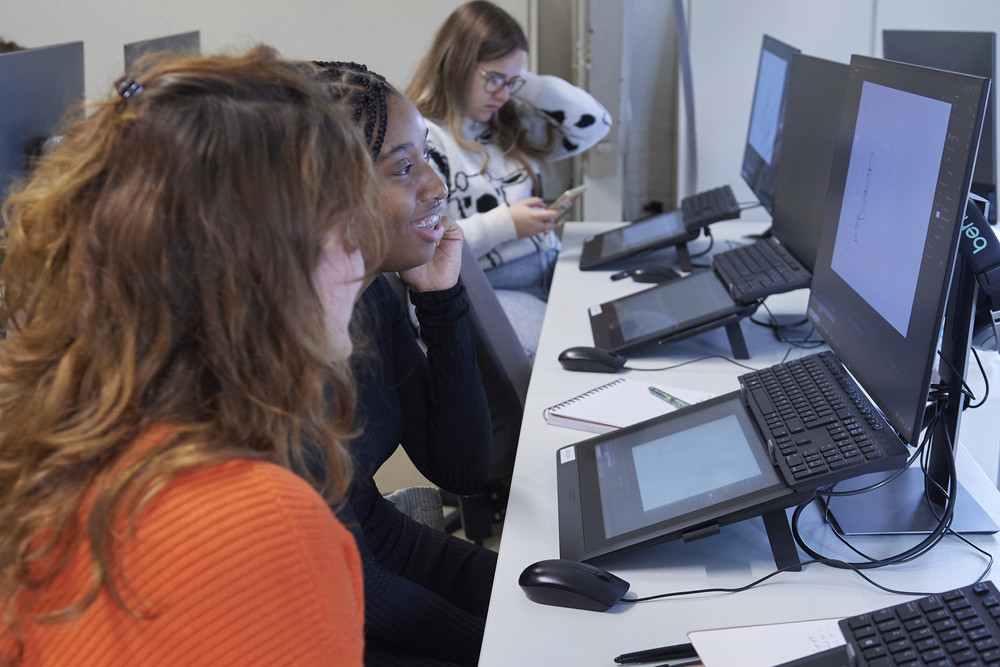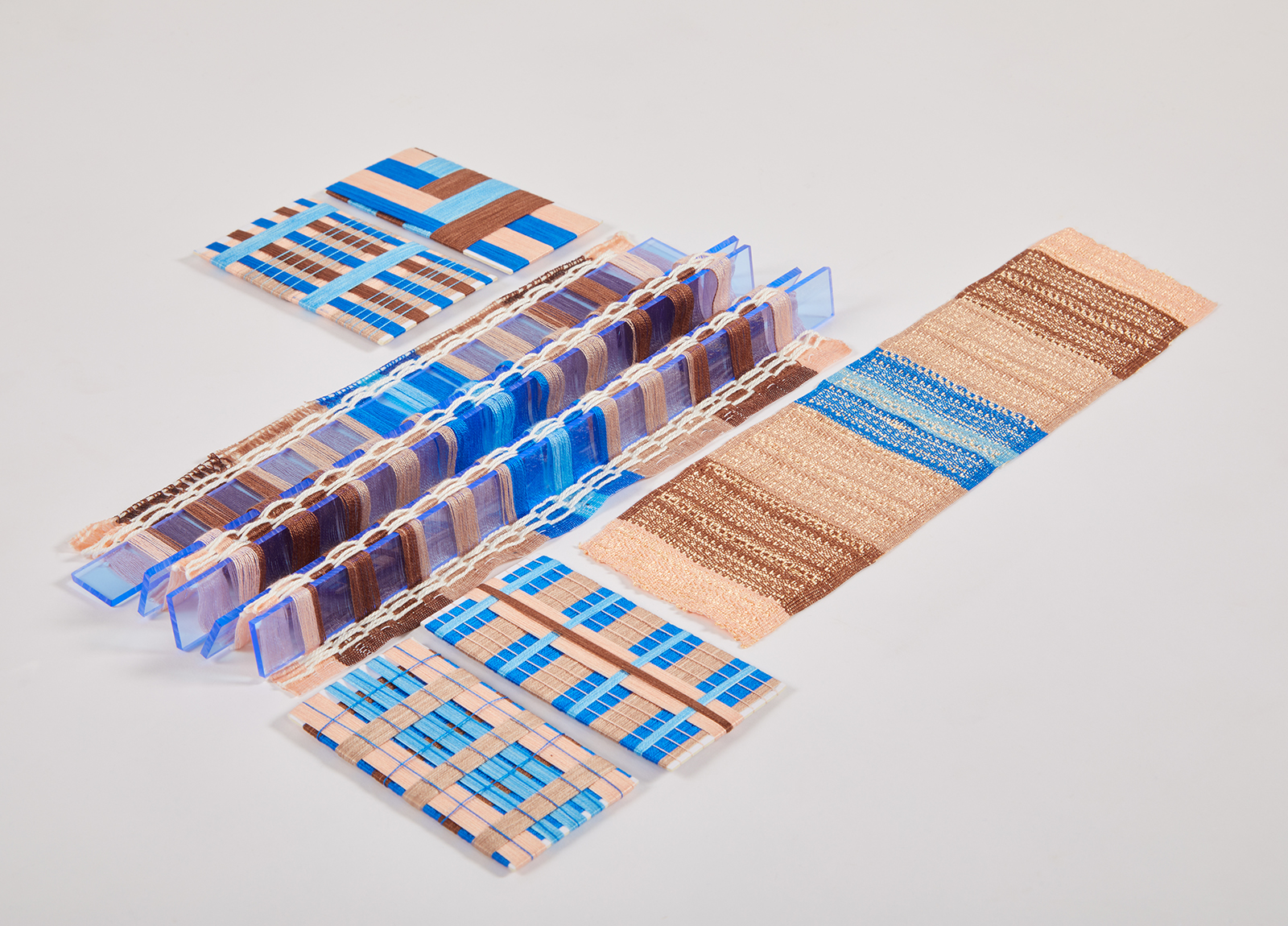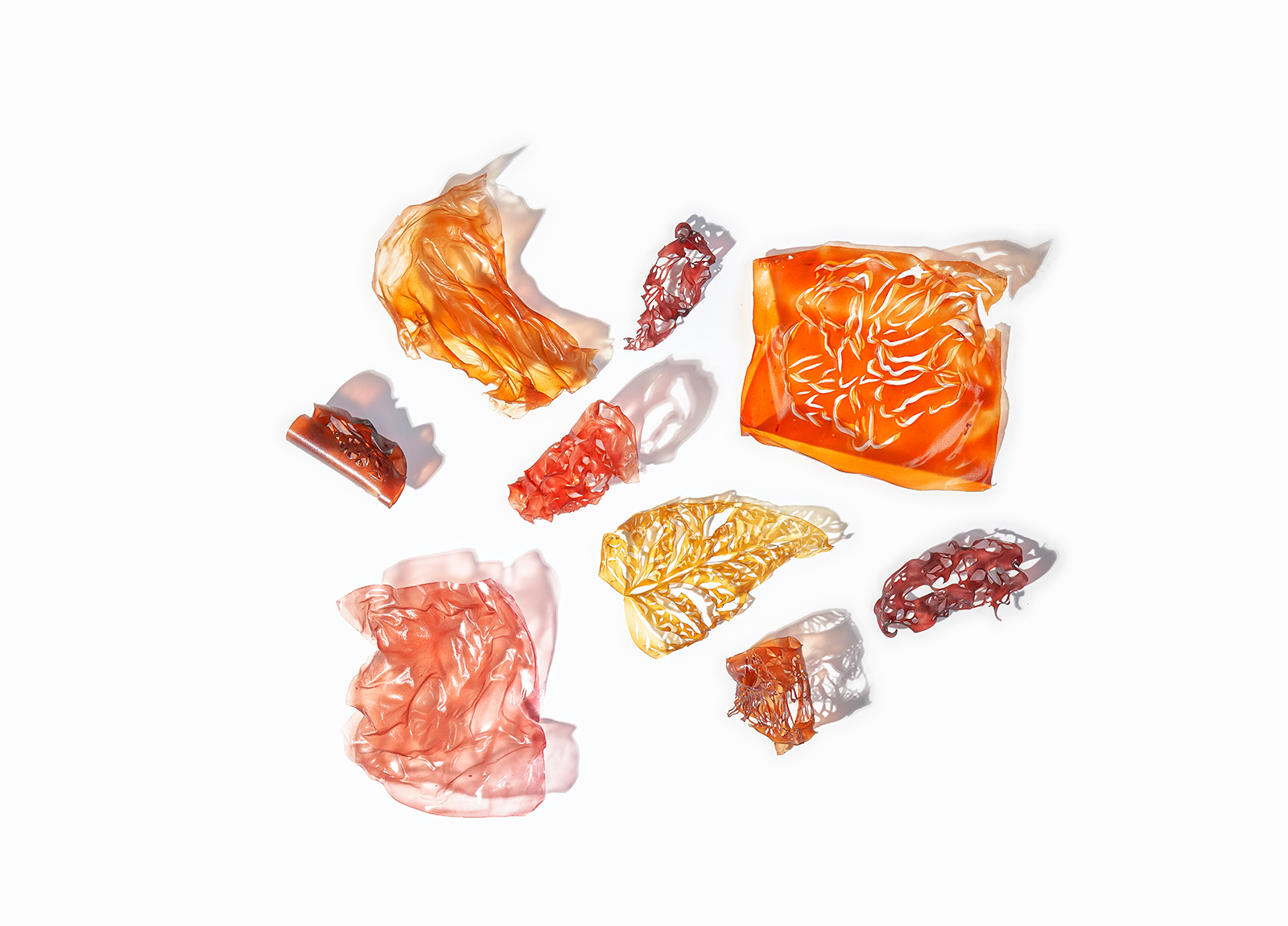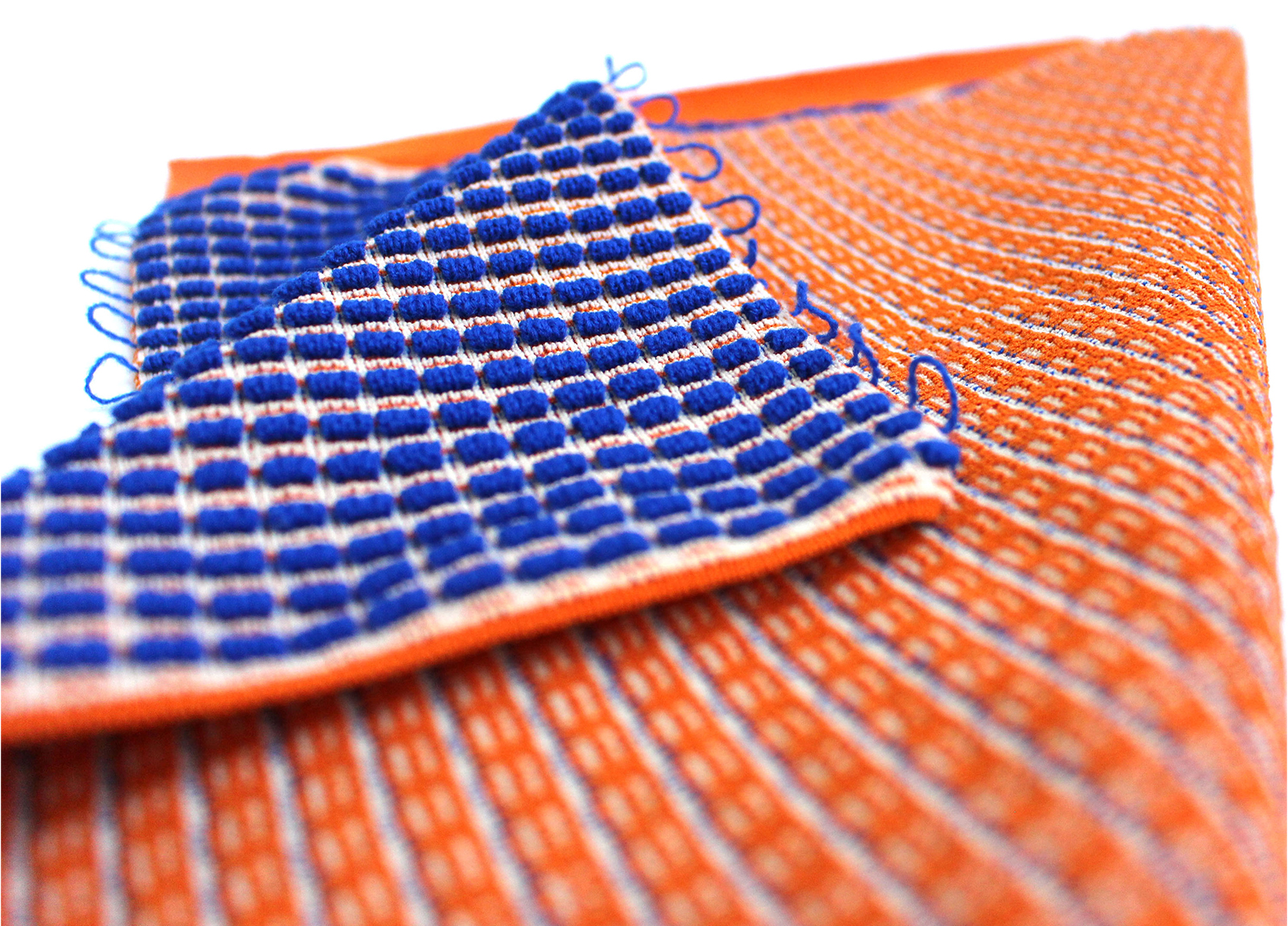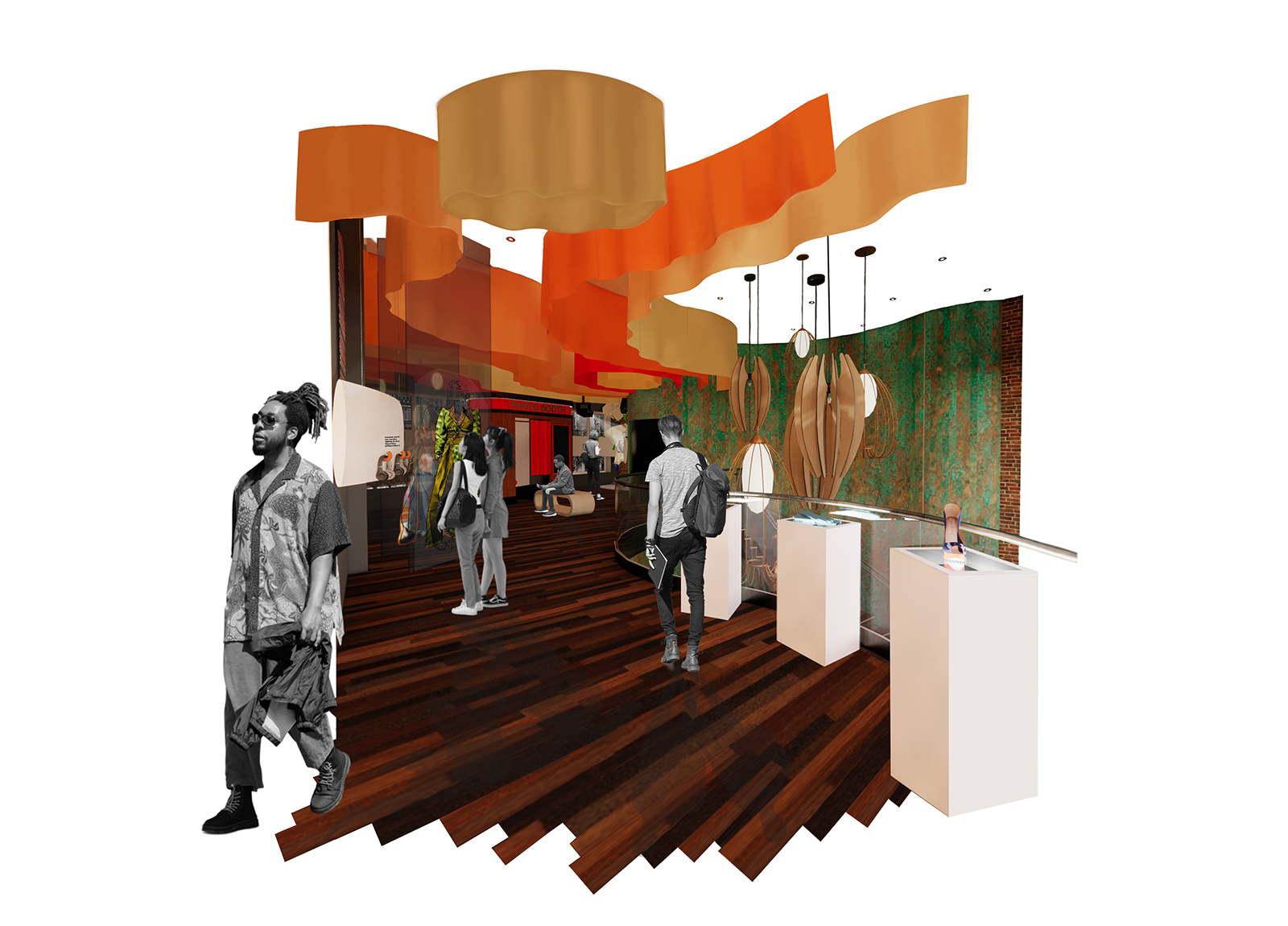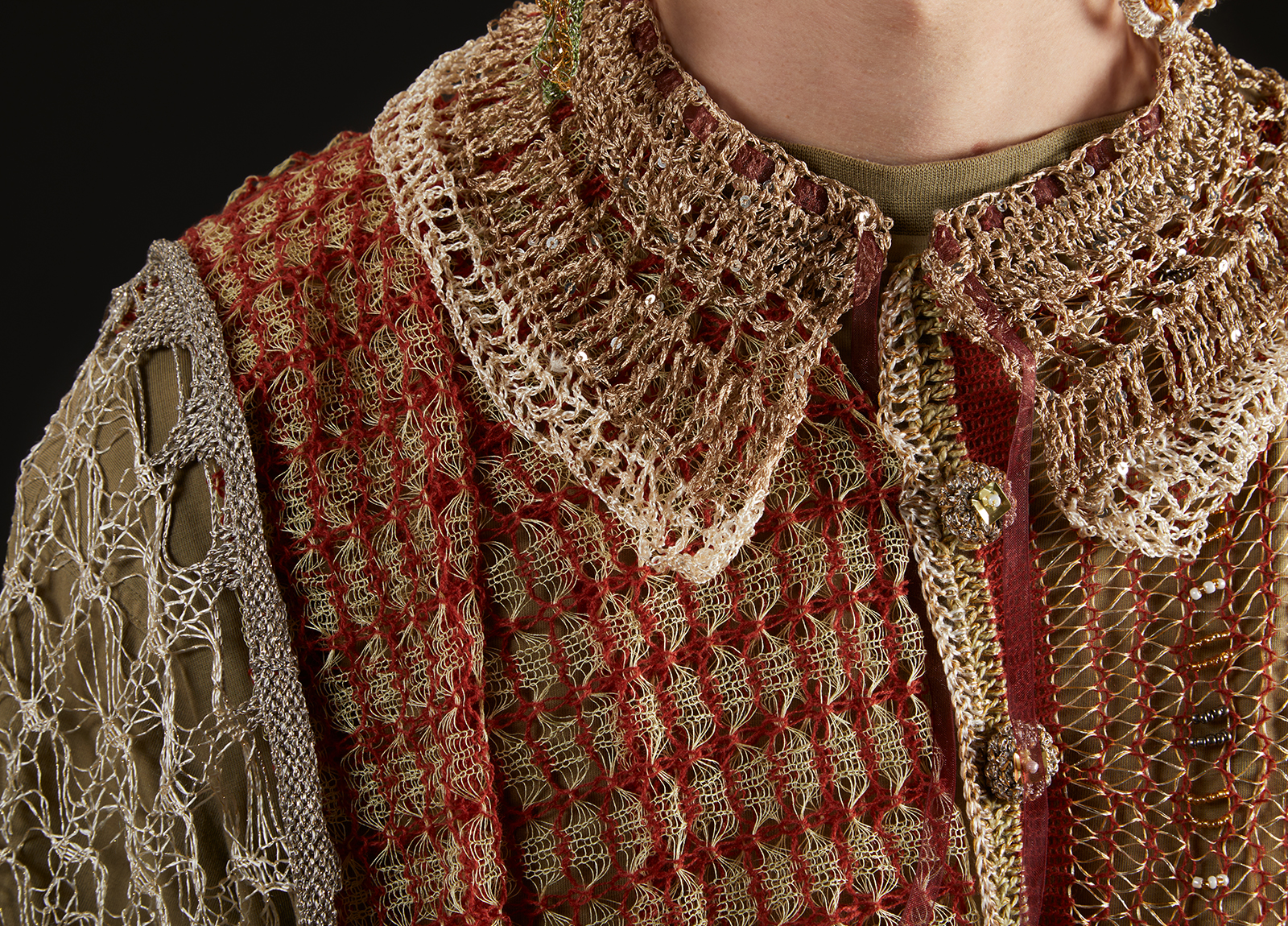
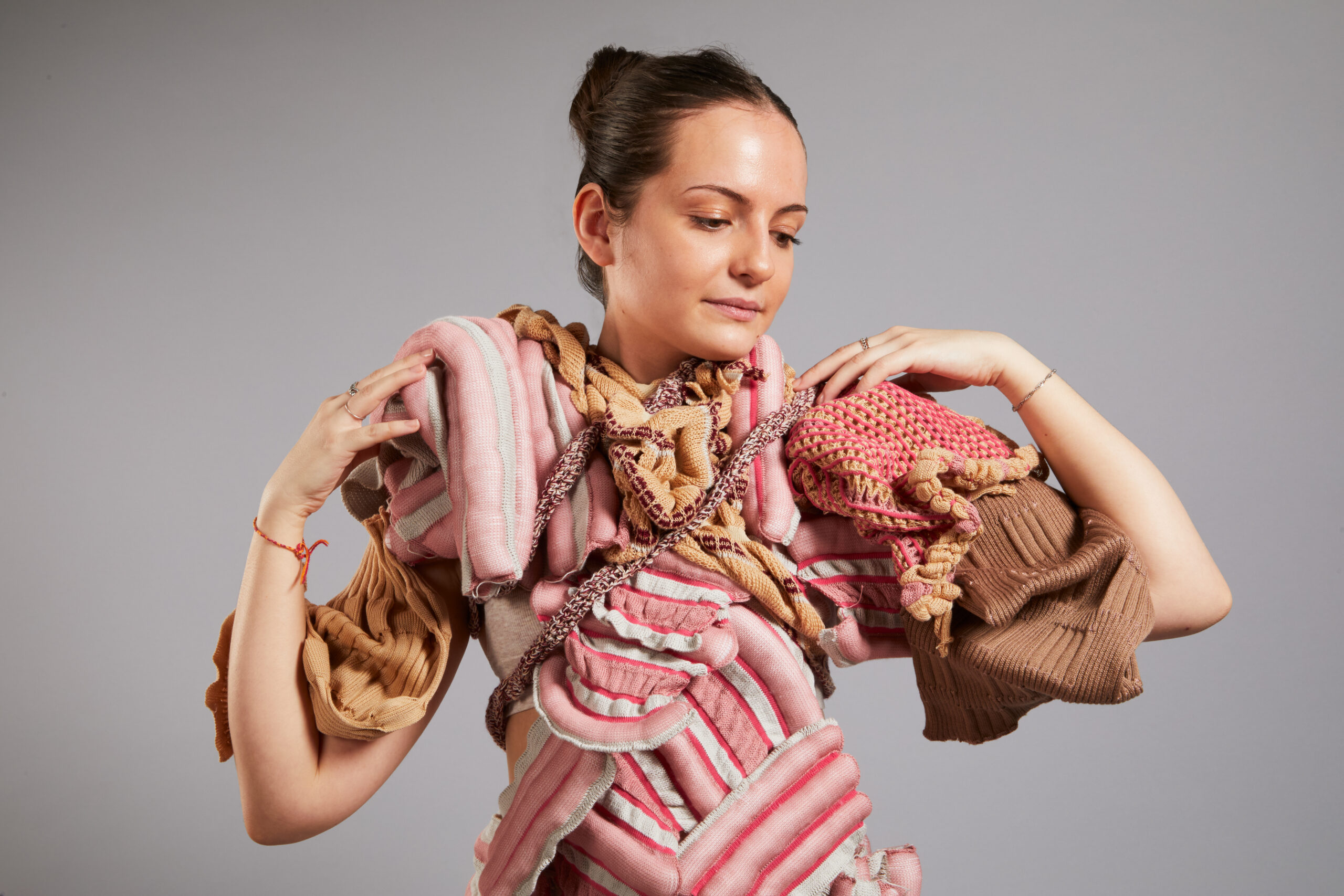
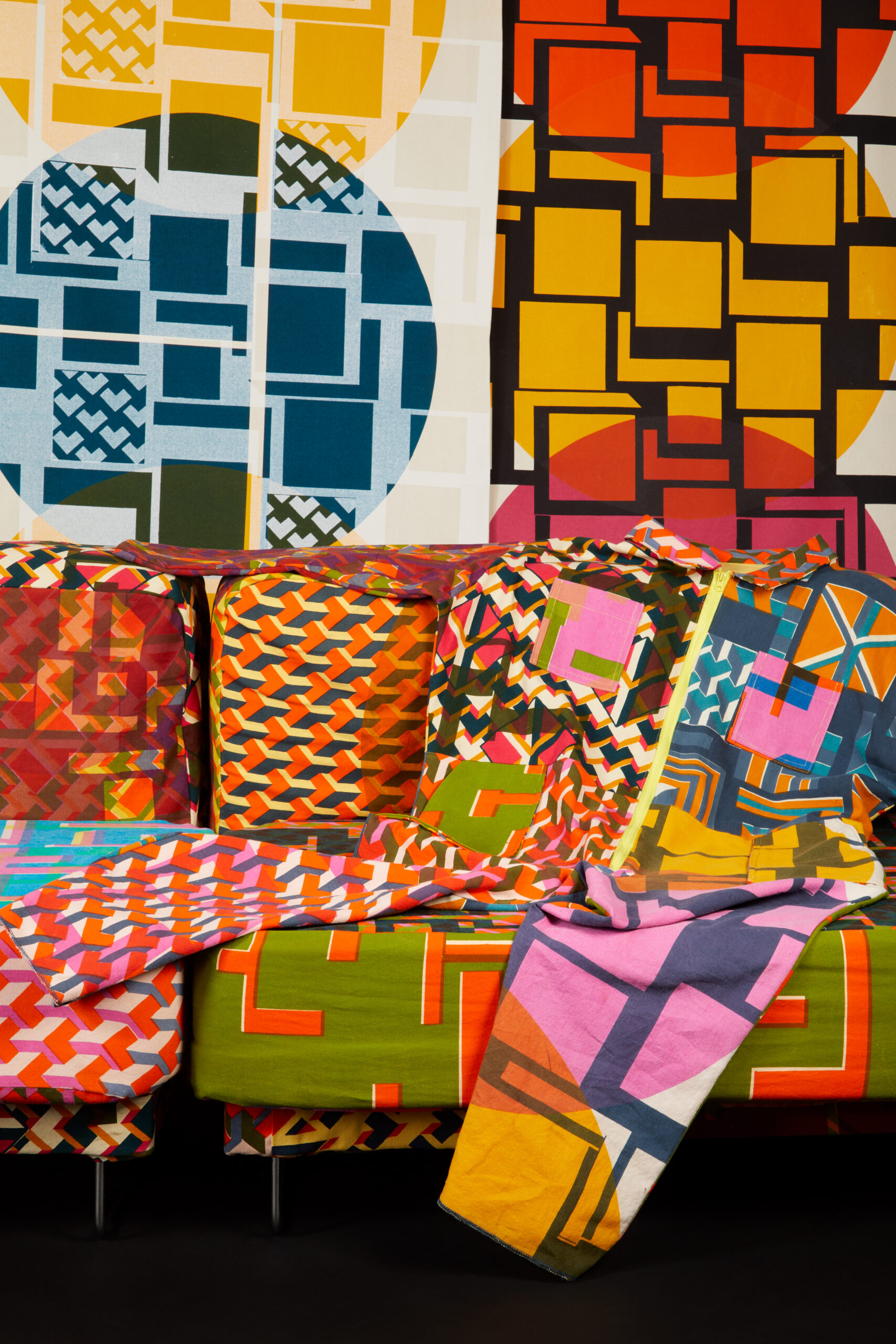
Textile Design BA (Hons)
BA (Hons) Textile Design at Norwich is the right choice for the curious and creative student with an interest in shaping our world as a responsible designer.
-
Course Duration
3 or 4 Year options
-
Course Options
- Diploma Year
- Intergrated Foundation Year
-
Typical Offer
104-120 UCAS Tariff Points
- How to Apply Request a prospectus
-
Annual Fees
- Home (full-time) £9,535
- Overseas (full-time) £18,860
-
UCAS code
- W231 (3 Year), W235 (4 Year)
- Institution code: N39
-
Course Start
September 2026
Textile Design is a broad discipline with ever-growing opportunities. At Norwich, we celebrate traditional and digital making processes including knit, print, weave and embellishment for broad contexts and applications including fashion, interiors, transport, galleries and beyond. You’ll be unconstrained by specialism throughout the course and will explore design thinking across textiles processes, from original concepts to ambitious outcomes.
As part of a supportive course community, students you will be supported to identify your personal and professional interests while developing creative, technical and industry skills. Establishing concepts, drawing and image making, pattern design, material sampling, draping and product design as well as collection development and final presentation / display will be key components of your project work.
Developing your own unique design language is encouraged throughout the course through concept development, making, and design resolution, embracing art, craft and digital media practices. Natural and synthetic colour, hard and soft materials and physical & digital contexts will be explored, with access to our excellent workshops.
You’ll design and make solutions for environments, bodies, and artefacts to drive change in how we all think about identity, inclusivity, wellbeing and textile consumption across this international industry.
Your commercial and industry understanding will be developed through live briefs, competitions, lectures and workshops with textile and fashion industry partners such as Habitat, Liberty, Ricamour, Colorifix, John Lewis, Next, Dulux and Norfolk Museums Service. International competitions and external-facing briefs will enable you to design for different contexts, ensuring you are industry-ready by the time you graduate, with a distinctive portfolio and a strong professional creative identity.
Why study with us
-
Join our passionate and creative community in celebrating and shaping the role textiles can play in the world around us.
-
Work with our expert technical staff in our inspiring specialist workshops with industry-standard facilities to establish your personal technical journey.
-
Work with our dedicated teaching team with a breadth of experience both in design and academia, supporting the needs of the individual and group, with engaging and insightful learning experiences.
-
Work in our spacious riverside studios and workshops with access to print, knit, weave and embellishment processes and a top-of-the-range digital creative suite.
-
Engage with industry agendas of sustainable practice and responsible design while addressing commercial and client needs for the wider world.
-
Support you and untap your curiosity and passion by exploring research themes and concepts, connecting you with historical narratives, contemporary debate and future possibilities.
Course Details
Integrated Foundation Year (optional)
Integrated Foundation Year
Our Integrated Foundation Year is designed to equip students with the necessary skills, knowledge and confidence to thrive in their chosen degree subject. The course provides a comprehensive introduction to various disciplines, blending critical thinking and creative problem-solving with practical hands-on experience. This year serves as a bridge to undergraduate studies, allowing students to explore their interests within a supportive and inspiring environment, while familiarising themselves with the campus, workshops, and tutors.
Year 1
Core Units
Creative Learning (40 credits)
This unit provides you with a dynamic exploration of the fundamentals of textile design, such as concept, drawing, materials, colour, and pattern and composition, through an exciting range of projects and workshops. You’ll develop your creative design ideas while gathering visual information to explore concepts through experimental and observational drawing, photography, and related research to inspire your work. Colour-related workshops include colour theory, the development of colour palettes, surface and dye processes, and screen printing. Ideas will be translated during material workshops in fabric manipulation and surface embellishment. Through lectures and seminars, you’ll examine contemporary designers from a range of perspectives, exploring the relationship between fashion, textiles, interiors, sustainability and wider visual culture.
40 credits
Explore and Experiment (80 credits)
This unit provides you with deeper engagement with textiles processes including knit, weave, print and embellishment, alongside further development of your personal visual and conceptual interests. Using an iterative approach, you’ll explore pattern and composition building, material and form, and customers / contexts. You will investigate diverse roles in the global textile industry and consider how your skills can be developed and applied to a range of opportunities. The practical content is underpinned by theoretical content to contextualise current practice within a historical framework. You will consider origins and influences and how traditions develop and evolve in response to social, sustainable and political contexts.
80 credits
Core Projects
Wayfinding Week
The first week of each academic year is called Wayfinding week. It’s an opportunity get your bearings, establish new connections and, after your first year at Norwich, re-establish old ones. Your course team will talk you through the year ahead and explain the expectations for the year. We’ll help you navigate new encounters and identify areas to focus on as you progress through your course.
Make it Manifest(o)
An important element of Wayfinding Week is taking part in our annual ‘Make it Manifest(o)’ project. Your course team will introduce the project in which we’ll ask you to consider your hopes and vision of the year ahead at Norwich and work with students in other year groups to bring your ideas to life. The project culminates in a celebratory display of work across the campus. The project will help you to develop your critical creativity through different approaches, concepts, and mediums. You’ll encounter diverse perspectives and build friendships and networks within our university community.
Interchange Week
Interchange weeks are opportunities to step away from your disciplinary studies and engage in projects, workshops, visits and talks that extend your knowledge and understanding of the world. Whether you learn a new skill or take part in a global challenge project with students from other courses, you will come away with new insights to take back to your course. Interchange is part of the schedule for all Norwich students with sessions held across and beyond the campus led by university staff, visiting lecturers and students.
Year 2
Core Units
Global Contexts (80 credits)
This unit will enable you to expand your specialist textiles knowledge and skills in both traditional techniques and innovative practices, building your portfolio for industry engagement. The year is characterised by communication, collaboration and professional practice, by working on industry-facing design briefs, with work completed for an external client, partner, competition or exhibition. You’ll be encouraged to take creative risks, work with a range of processes, and take part in advanced workshops in applications of digital tools for design, manufacture, and communication. You’ll research and explore relevant contemporary global concepts and strategies to underpin your understanding of contemporary issues in the creative industries. You’ll develop an understanding of the need to conduct market research and develop a greater awareness of using trend information as part of your design process, designing for products and collections across materials and applications.
80 credits
Collaboration (40 credits)
This unit will introduce you to the different ways collaborative working can help you focus and enhance your creative strengths, working with fellow students and our creative communities. This unit will build upon your communication skills, focusing on problem-solving, critical thinking, teamwork, listening, negotiation, and reflection, as you work towards a common set of project goals, enhancing your employability, presentation, and communication skills. This unit encourages you to explore your practice as a responsible textile designer. You’ll be thinking about creating new work, materials, products or services that factor in environmental, social, economic and cultural costs. Through our career and employability sessions, you’ll begin to define your place as a designer in a global context and potential directions for your work, helping inform your future career aspirations. You will identify and explore theoretical research interests to shape your progression into the final year of study.
40 credits
Core Projects
Wayfinding Week
The first week of each academic year is called Wayfinding week. It’s an opportunity get your bearings, establish new connections and, after your first year at Norwich, re-establish old ones. Your course team will talk you through the year ahead and explain the expectations for the year. We’ll help you navigate new encounters and identify areas to focus on as you progress through your course.
Make it Manifest(o)
An important element of Wayfinding Week is taking part in our annual ‘Make it Manifest(o)’ project. Your course team will introduce the project in which we’ll ask you to consider your hopes and vision of the year ahead at Norwich and work with students in other year groups to bring your ideas to life. The project culminates in a celebratory display of work across the campus. The project will help you to develop your critical creativity through different approaches, concepts, and mediums. You’ll encounter diverse perspectives and build friendships and networks within our university community.
Interchange Week
Interchange weeks are opportunities to step away from your disciplinary studies and engage in projects, workshops, visits and talks that extend your knowledge and understanding of the world. Whether you learn a new skill or take part in a global challenge project with students from other courses, you will come away with new insights to take back to your course. Interchange is part of the schedule for all Norwich students with sessions held across and beyond the campus led by university staff, visiting lecturers and students.
Diploma Year (optional)
Level 5 Diploma (120 credits)
Students have the opportunity to spend a year after the second of their degree (or the third year if studying for a degree with an Integrated Foundation Year) enhancing their employability options through a Level 5 Diploma. They can choose from courses designed to provide:
- opportunities to gain industry insight, developing employability skills through a series of supported experiences, expanding professional networks and building confidence in the workplace, or
- an introduction to creative computing, building an understanding of how coding skills can be used to advance and complement creative practice.
Final Year
Core Units
Research and Preparation (40 credits)
This is the first and shorter of the two units that make up your final year of study. Your final year allows you to refine your existing creative practice, develop your skills, and reflect upon your experience, with opportunities to engage with live projects, competitions, and professional bodies, to broaden your portfolio and strategically enhance career directions. The unit encourages innovation through an experimental, process-driven approach to technical and material development, using advanced production techniques in knit, weave, print, stitch, both traditional and digital. You’ll develop an individual research project that advances your knowledge of contextual issues, cultural theories and practices. Group and individual tutorials will provide stimulating and supportive sessions to help you develop your research ideas and those of others.
40 credits
Resolution and Career Development (80 credits)
This unit will allow you to deliver a final major design project, embracing the entire design process, and demonstrating your approach to, and engagement with, contemporary textile design practices and industry partners. Emphasis is placed on students’ abilities to evaluate, make informed choices for selecting methods and processes, and create innovative outcomes. Your work will become increasingly self-directed in relation to personal ambitions, and you will consolidate your knowledge and understanding to develop an independent creative voice preparing you for entry into professional practice or engagement in further research. We celebrate the end of the year with our Textile Design Industry Awards event, with past judges from John Lewis, Art Angels Publishing, and Dulux. You’ll have the opportunity to display your final year project as part of our degree show, Grad Fest, which allows you to showcase your work to our network of industry professionals and prospective employers.
80 credits
Core Projects
Wayfinding Week
The first week of each academic year is called Wayfinding week. It’s an opportunity get your bearings, establish new connections and, after your first year at Norwich, re-establish old ones. Your course team will talk you through the year ahead and explain the expectations for the year. We’ll help you navigate new encounters and identify areas to focus on as you progress through your course.
Make it Manifest(o)
An important element of Wayfinding Week is taking part in our annual ‘Make it Manifest(o)’ project. Your course team will introduce the project in which we’ll ask you to consider your hopes and vision of the year ahead at Norwich and work with students in other year groups to bring your ideas to life. The project culminates in a celebratory display of work across the campus. The project will help you to develop your critical creativity through different approaches, concepts, and mediums. You’ll encounter diverse perspectives and build friendships and networks within our university community.
Interchange Week
Interchange weeks are opportunities to step away from your disciplinary studies and engage in projects, workshops, visits and talks that extend your knowledge and understanding of the world. Whether you learn a new skill or take part in a global challenge project with students from other courses, you will come away with new insights to take back to your course. Interchange is part of the schedule for all Norwich students with sessions held across and beyond the campus led by university staff, visiting lecturers and students.
Download course specifications
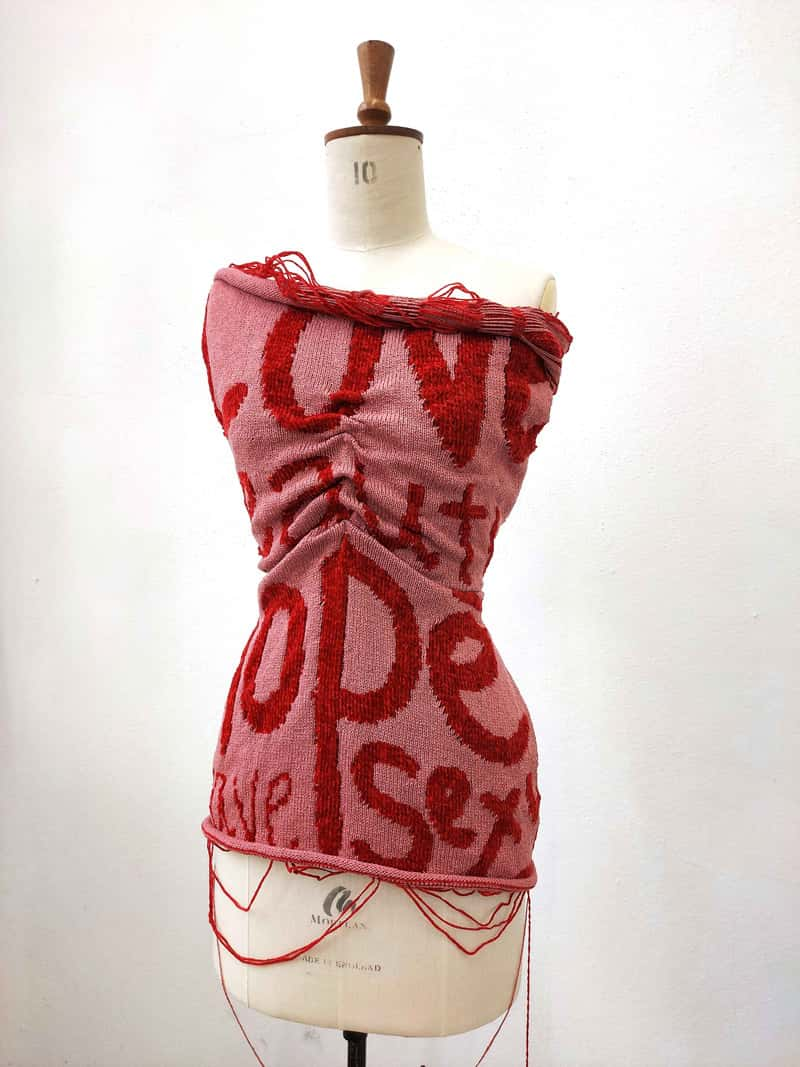
Learning and teaching
This course is taught through a mixture of learning and teaching methods including:
-
Group briefings
-
Academic tutorials
-
Group tutorials
-
Workshops
-
Critiques (crits)
-
Seminars
-
Lectures
Assessment
Assessment for this course is entirely coursework-based, meaning there are no exams. Your progress will be evaluated through the projects and assignments you complete for each unit. Throughout the year, you’ll receive ongoing feedback to help you refine your work and develop your skills. To support your learning and ensure you achieve the course outcomes, we use a variety of assessment methods, including:
- Finished pieces of work
- Presentations
- Written work
- Your research
- A reflective journal
Some of the people you’ll be working with
Our Facilities
Look around our city-centre campus, and you will find studios, media labs, and creative spaces in 13 buildings that sit among the cafés, bars, independent galleries and shops of Norwich’s cultural quarter.
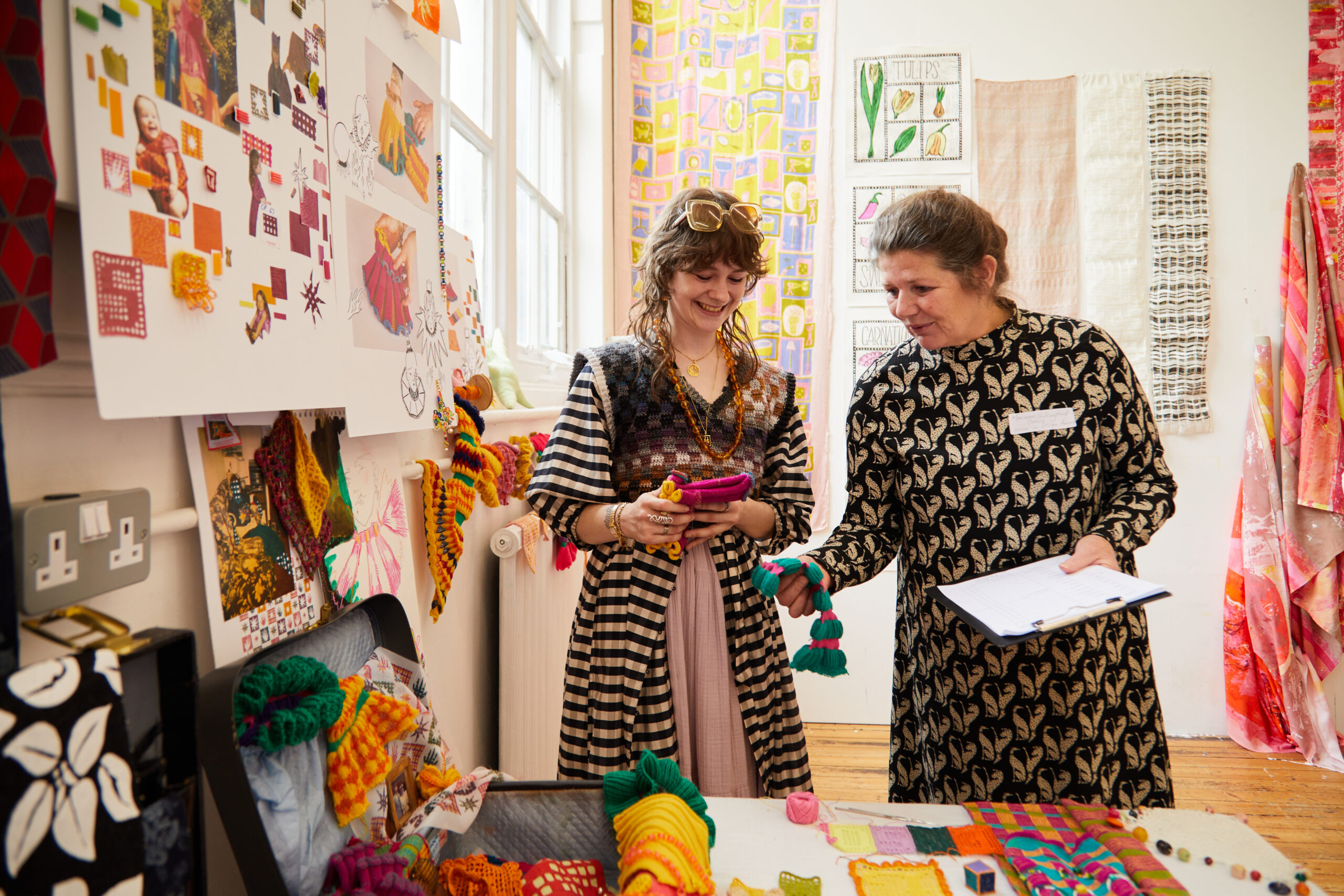
Typical career paths
Transferable skills are developed throughout the course, embedded within the learning experience to build your confidence and personal professional identity. Strong communication skills, negotiation, team-working and time-management are highly desirable employability skills which we help you to hone. Throughout the course you will be supported in learning about industry roles and professional attributes to support your career development. In your final year, you’ll develop a strategy for your future direction and showcase your skills and attributes through your portfolio.
Graduates have secured diverse roles in textile-related positions and beyond, including manufacturing companies such as Ivo Prints, Whitchurch Silk Mill and Standfast & Barracks and design studios including Next Home, Abacus Cards, Joules, and Bay and Brown. Many establish their own businesses, including Kalopsia Collective, Rachel Parker and Amelia Ellwood.
- Textile designer
- Designer maker
- Knitwear designer
- Surface pattern designer
- Product designer
- Buyer
- Stylist
- Illustrator
- Wallcoverings designer
- Visual merchandiser
- Materials researcher
- Interior designer
- Researcher
- Public artist
- Stationery designer
- Branding executive
- Conservator
- Graphic designer
- Installation designer
- Trend forecaster
- Event designer
- Art therapist
- Archivist
“92% of our graduates are in employment or further education within six months of graduating”
Graduate Outcomes 2021
Entry requirements
Home
Norwich University of the Arts welcomes applicants of all ages from all backgrounds.
If the qualification that you are studying is not shown, do not worry as we are able to accept other pre-entry qualifications as well as combinations of different qualifications.
Please do contact our Student Recruitment Team if you have any queries.
A/AS Levels (GCE)
GCE A/AS Levels 3 A-level qualifications at grades BCC (104 UCAS Tariff points) or above. Where candidates are not taking 3 A-levels, Norwich University of the Arts will consider combinations of A-level/AS-level and other Level 3 qualifications.
BTEC Extended Diploma (QCF or RQF)
Distinction, Merit, Merit in an art, design or media related subject
BTEC Diploma (QCF or RQF)
Distinction*, Distinction* in an art, design or media related subject
T Levels
A T Level in any subject with overall grade A* to C (Pass)
UAL Extended Diploma
Merit
UAL Level 3 Foundation Diploma in Art and Design
Pass
UAL Level 4 Foundation Diploma in Art and Design
Pass
Foundation Diploma in Art and Design
Pass
Access to Higher Education Diploma (Art and Design)
Pass
International Baccalaureate Diploma
A minimum of 26 points
Integrated foundation year (optional)
Norwich University of the Arts welcomes applicants of all ages from all backgrounds.
If the qualification that you are studying is not shown, do not worry as we are able to accept other pre-entry qualifications as well as combinations of different qualifications.
Please do contact our Student Recruitment Team if you have any queries.
A/AS Levels (GCE)
GCE A/AS Levels 2 A-level qualifications at grades CC (64 UCAS Tariff points) or above.
BTEC Extended Diploma (QCF or RQF)
Merit, Merit, Pass in an art, design or media related subject
BTEC Diploma (QCF or RQF)
Distinction*, Merit in an art, design or media related subject
T Levels
Pass (D or E on the core)
UAL Extended Diploma
Pass
UAL Level 3 Foundation Diploma in Art and Design
Pass
UAL Level 4 Foundation Diploma in Art and Design
Pass
Foundation Diploma in Art and Design
Pass
International Baccalaureate Diploma
A minimum of 26 points
Overseas
We accept qualifications from all over the world.
To find our entry requirements from a specific country, please check our dedicated international pages.
English language qualifications
Most international students are required to hold an English language qualification. Applicants are required to have a minimum UKVI approved IELTS exam score of 6.0 overall, with a minimum of 5.5 in each section. Equivalent English language qualifications are acceptable such as, IB English language syllabus A or B/English Literature (Grade 4).
We also accept some alternative English qualifications. Learn more about our English entry requirements.
You can email us on international@norwichuni.ac.uk if you’d like to discuss your application individually.
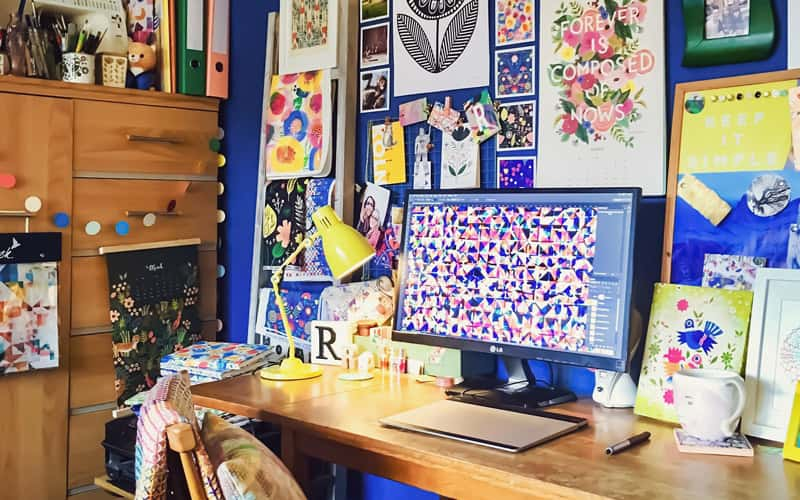
Fees and funding
Home
Tuition fees for the 2025/26 academic year
- BA course (three year): £9,535 per year
- Integrated Foundation Year (optional): £9,535 per year
- Level 5 Diploma Year (optional): £9,535 year
The level of fee that you will be asked to pay depends on whether you’re classed as a UK (home) or international student. Check your fee status.
Fees for subsequent years
Tuition fees may increase in subsequent years in line with inflation, subject to government regulations. The inflation rate used is expected to be the Retail Price Index excluding mortgage payments (RPIX). We would confirm this in advance to you of each academic year.
Find our more about fees and funding
Funding your study
Depending on your circumstances, you may qualify for a bursary, scholarship or loan to help fund your study and enhance your learning experience.
Additional Costs
Your course fees cover the cost of studies, and include loads of benefits, such as the use of our library, support from our expert employability team, access to workshops and free use of the IT equipment across our campuses. There are also other costs which you may need to consider.
International
Tuition fees for the 2025/26 academic year:
- BA course (three year): £18,500
- Integrated Foundation Year (optional): £18,500
- level 5 Diploma year (optional): £18,500
The level of fee that you will be asked to pay depends on whether you’re classed as a UK (home) or international student. Check your fee status.
Fees for subsequent years
For Overseas students starting in 2025 inflation will be applied to your fees in later years. We will confirm this in advance to you of each academic year, and we will limit the increase to no more than the Office for Students’ recommended inflationary measure.
Find our more about fees and funding
Funding your study
Please take a look at our International students page for information about fees, scholarships for international students, visas and much more.
Additional Costs
Your course fees cover the cost of studies, and include loads of benefits, such as the use of our library, support from our expert employability team, access to workshops and free use of the IT equipment across our campuses. There are also other costs which you may need to consider.
How to apply
Home
All applications for undergraduate courses will need to be made via the Universities and Colleges Admissions Service (UCAS).
You’ll need our university UCAS code (N39) as well as your course code which you’ll find on your course page.
When you register with UCAS you will need include your previous and current qualifications information, personal statement, and reference.
Once we receive your application form through UCAS, we will email confirmation that we have received it and will give you access and instructions for logging into the applicant portal. Our decision will be communicated via UCAS.
Applying for an undergraduate degreeInternational
Full-time Undergraduate International applicants can either apply via UCAS or directly by completing the online application form below or emailing the downloadable form to ioadmissions@norwichuni.ac.uk
Online Application Form (opens in a new window)For further support for international applicants applying for an undergraduate degree view our international pages.
-
Charlotte Standen
Textile Design BA (Hons)
Bee Hale
Textile Design BA (Hons)
Brandon Tan
Textile Design BA (Hons)
Charlotte Walker
Textile Design BA (Hons)
Elodie Reid-Williams
Textile Design BA (Hons)
Jess White
Textile Design BA (Hons)
Kiera Morel
Textile Design BA (Hons)
Ria Drake
Textile Design BA (Hons)
Rosie Marden
Textile Design BA (Hons)

Latest news
-
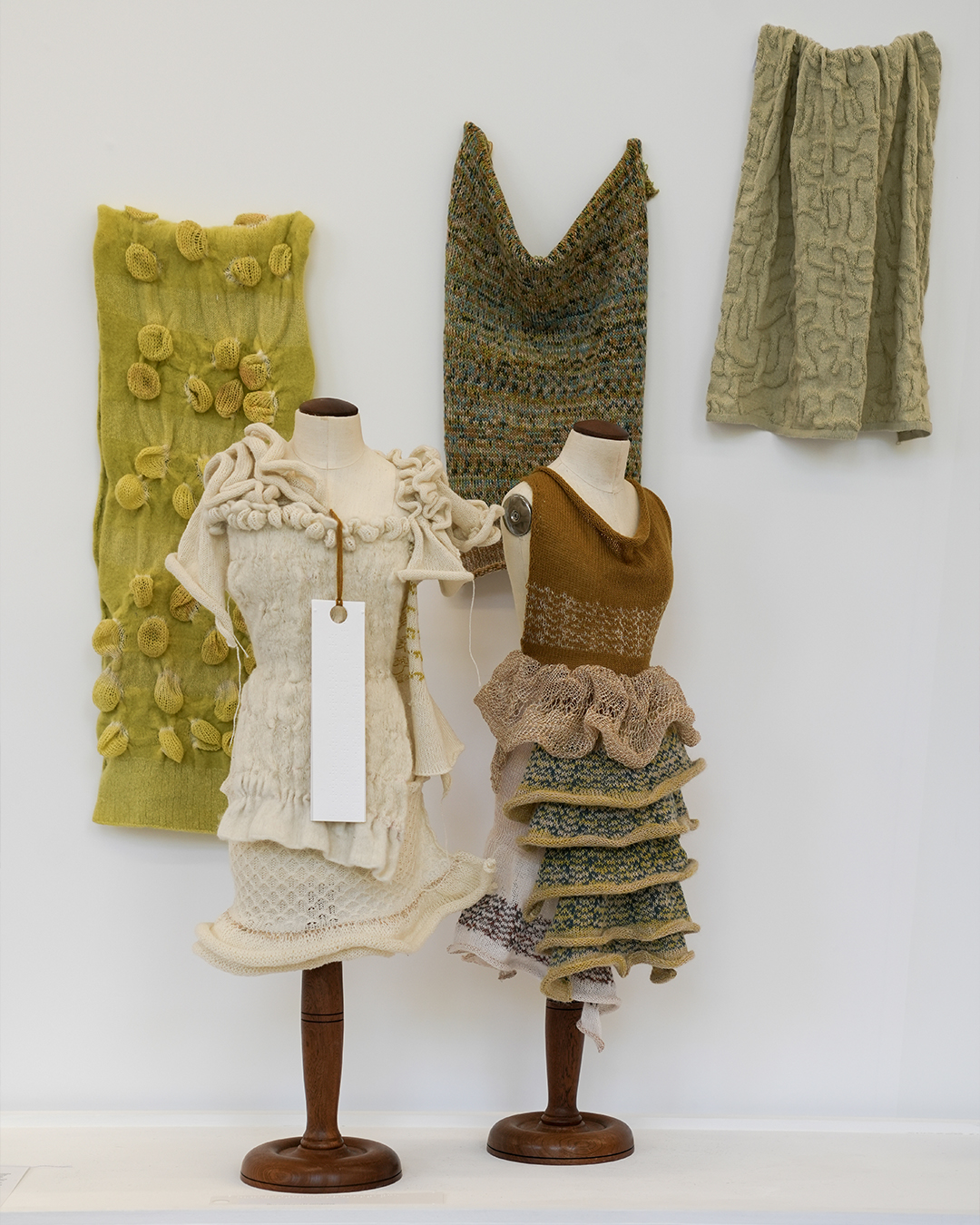 BA Animation •
BA Animation •Celebrating award-winning student work at our Undergrad Festival – and beyond
This summer saw the launch of the University’s new Sustainability Awards, alongside nominations for Norwich students for a range of high-profile industry awards. -
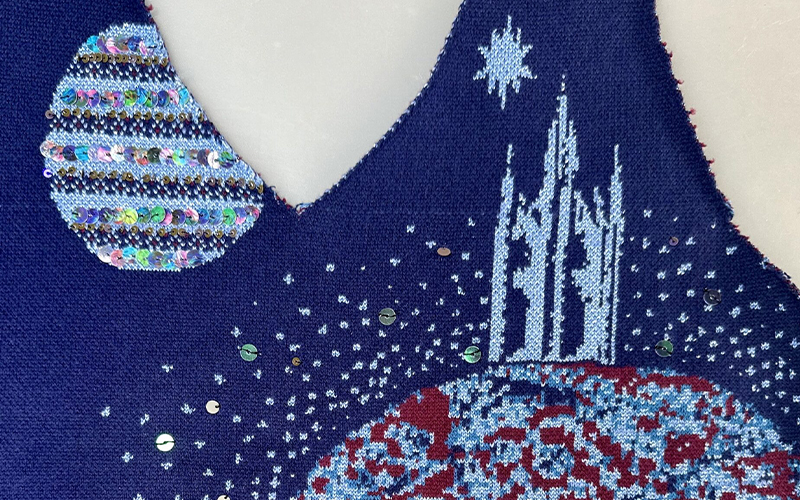 BA Textile Design •
BA Textile Design •Embracing AI in Textile Design: A journey of creativity and collaboration
BA (Hons) Textile Design student, Megan Merhar, shares her journey of incorporating AI into her creative process. -
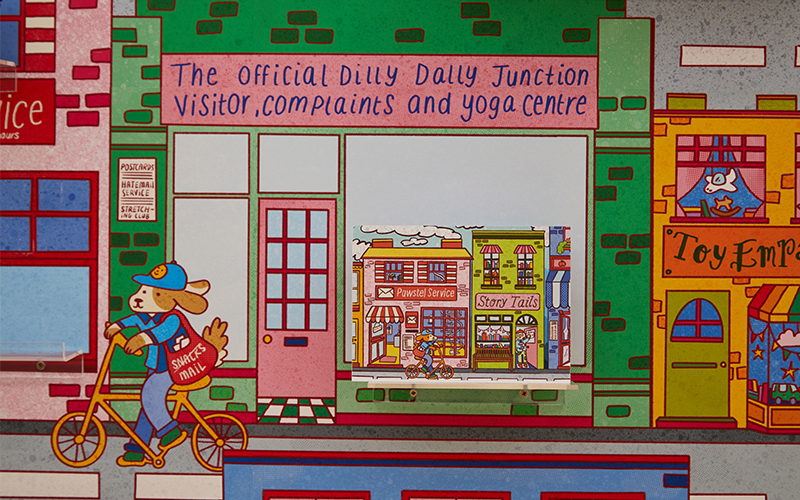 BA Illustration •
BA Illustration •Norwich students honoured at New Designers
Congratulations to BA (Hons) Textile Design and BA (Hons) Illustration students -
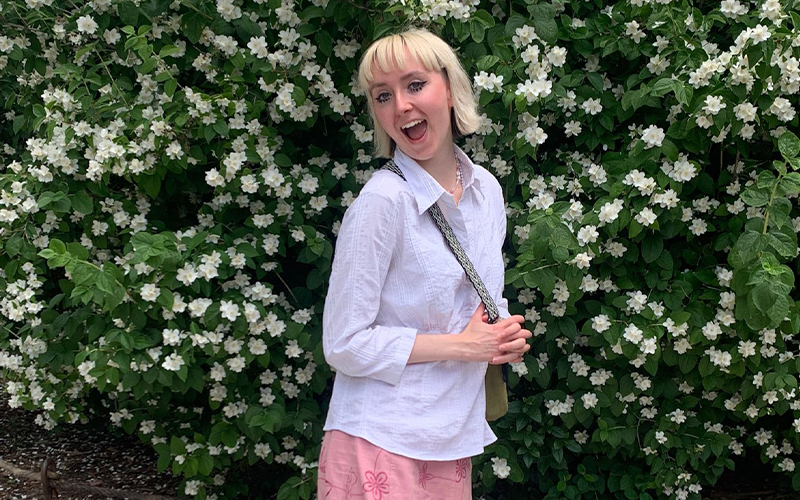 BA Textile Design •
BA Textile Design •In conversation with: Molly De Smith, BA (Hons) Textile Design
Molly De Smith discusses what it’s like studying BA (Hons) Textile Design at Norwich. -
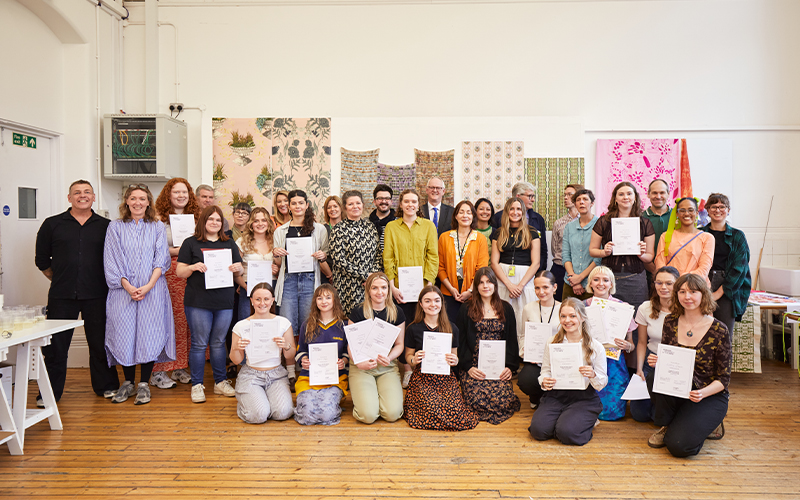 BA Textile Design •
BA Textile Design •Student success at the annual BA (Hons) Textile Design Industry Awards
Student success at the annual BA (Hons) Textile Design Industry Awards -
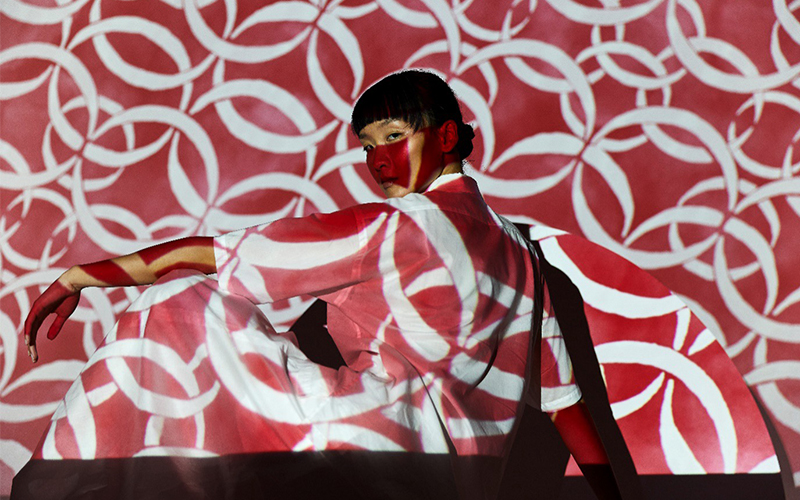 BA Textile Design •
BA Textile Design •Academics and students work with designers to develop a teaching methodology for AI
Academics and students work with designers to develop a teaching methodology for AI -
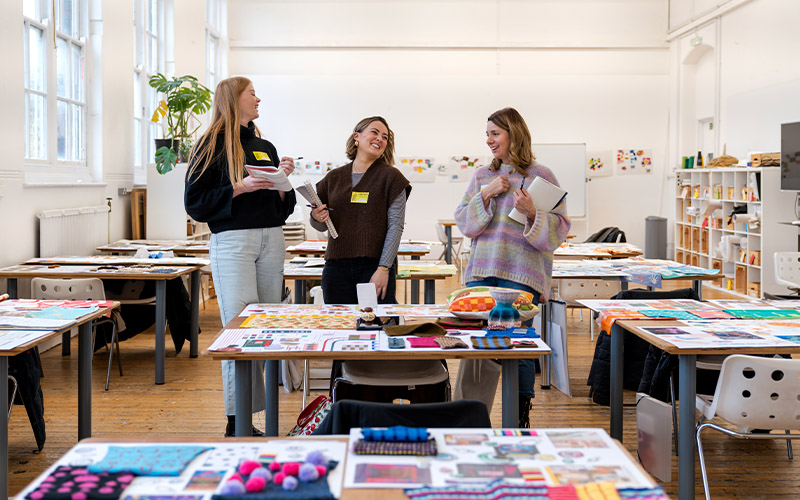 BA Textile Design •
BA Textile Design •Crafting collections for Habitat: a BA Textile Design live brief
Challenged by Habitat designers, Textile Design students responded to one of two briefs. -
 BA Acting •
BA Acting •Take a look back at Norwich University of the Arts Graduation 2023
Explore photos and memories from our two-day graduation celebrations in this photo blog. -
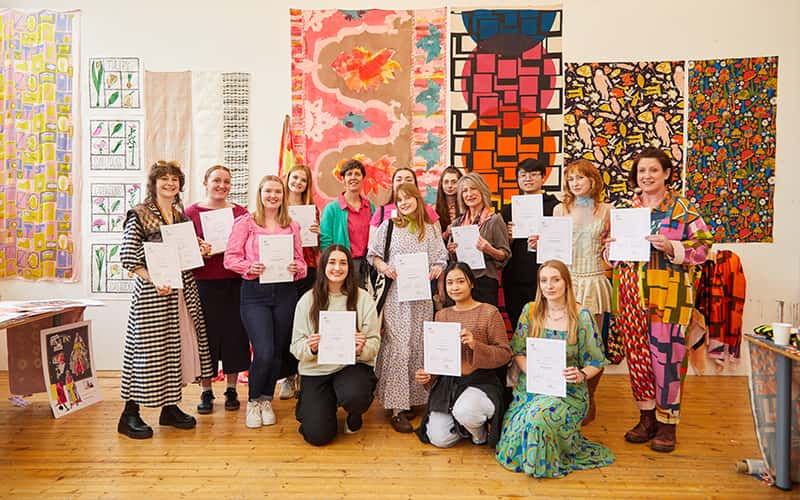 BA Textile Design •
BA Textile Design •Success for students at the annual BA (Hons) Textile Design Industry Awards
BA (Hons) Textile Design Industry Awards -
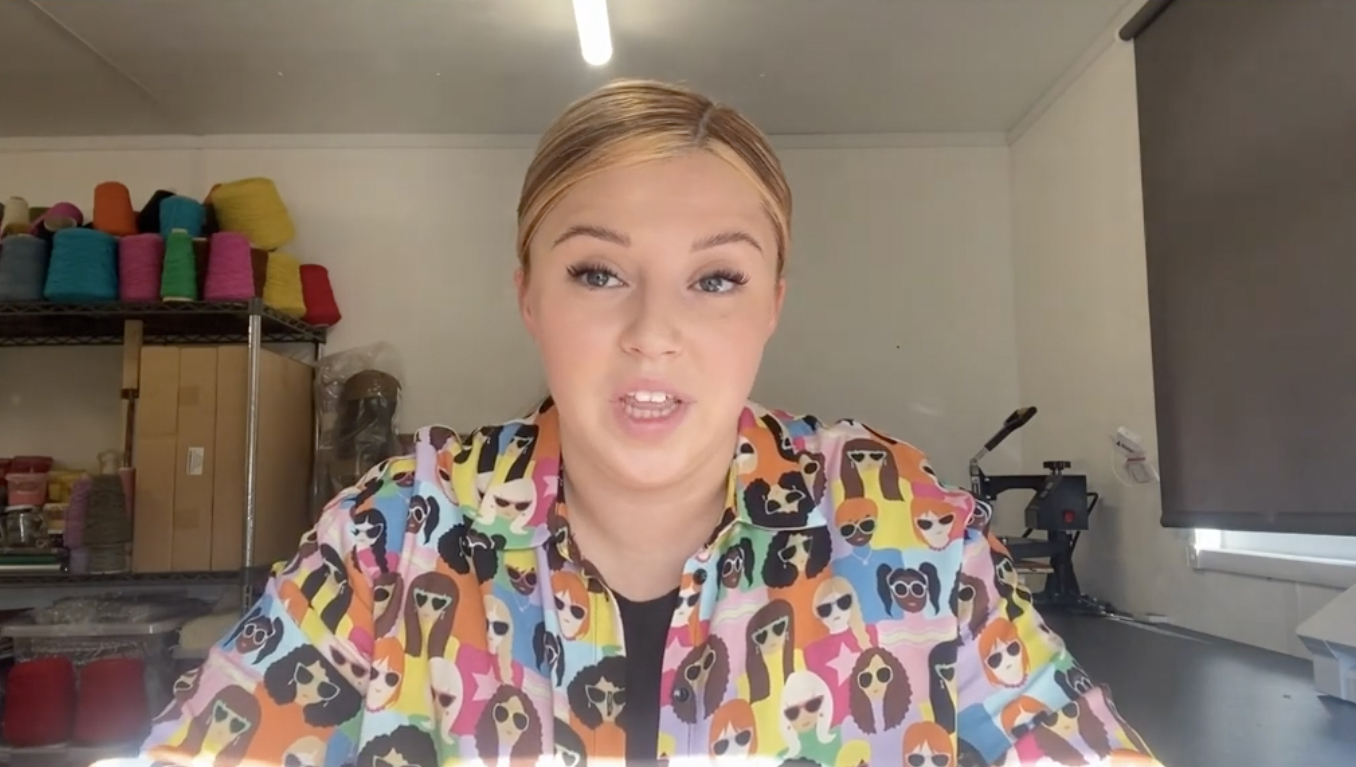 Alumni •
Alumni •In conversation with alumni Evie Thomas
Evie talks to us about how she got her design in Sainsbury's stores and her career since graduating. -
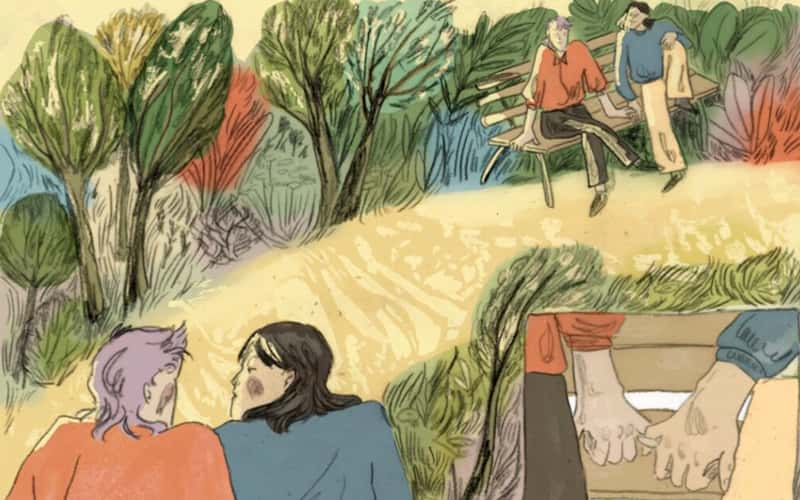 BA Fine Art •
BA Fine Art •Three students shortlisted for The Batsford Prize 2023
Students from Textile Design, Fine Art and Illustration have been shortlisted for the award. -
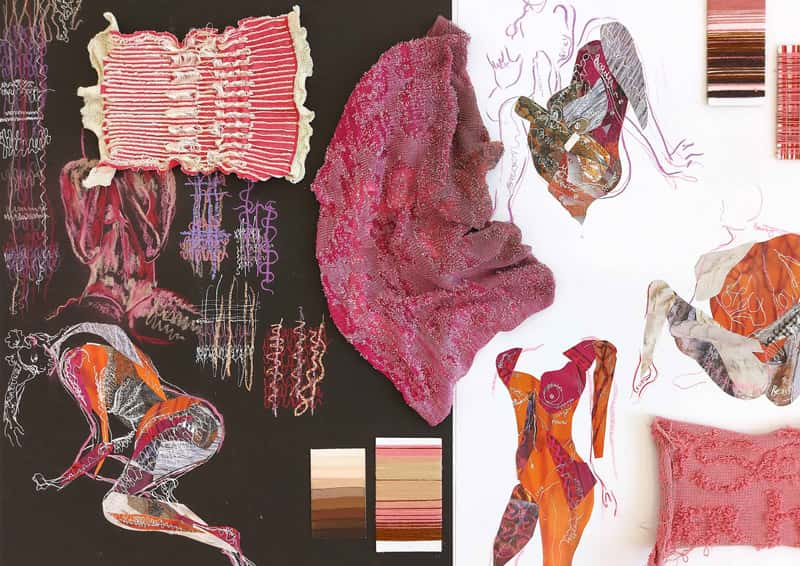 BA Textile Design •
BA Textile Design •Hollie Cooper wins second prize in the Bradford Textile Society Design Competition 2022
Hollie won the prize for her textile project focusing on breast cancer. -
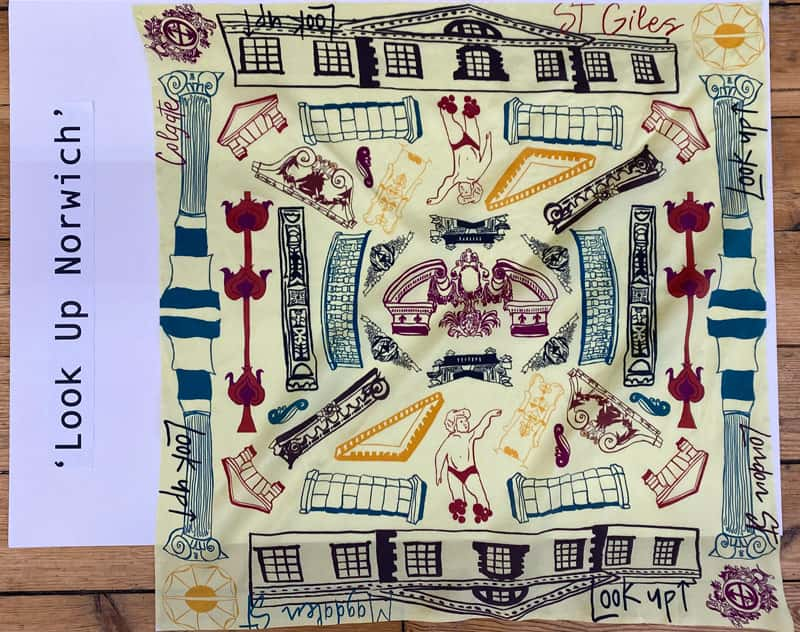 BA Textile Design •
BA Textile Design •How it started vs. How it's going: Emma's BA Textile Design scarf project
Explore our series looking at the development of student work from start to finish.
Related courses
Discover our courses and take the first step towards unleashing your potential
-
Visit the Fashion BA (Hons) course page
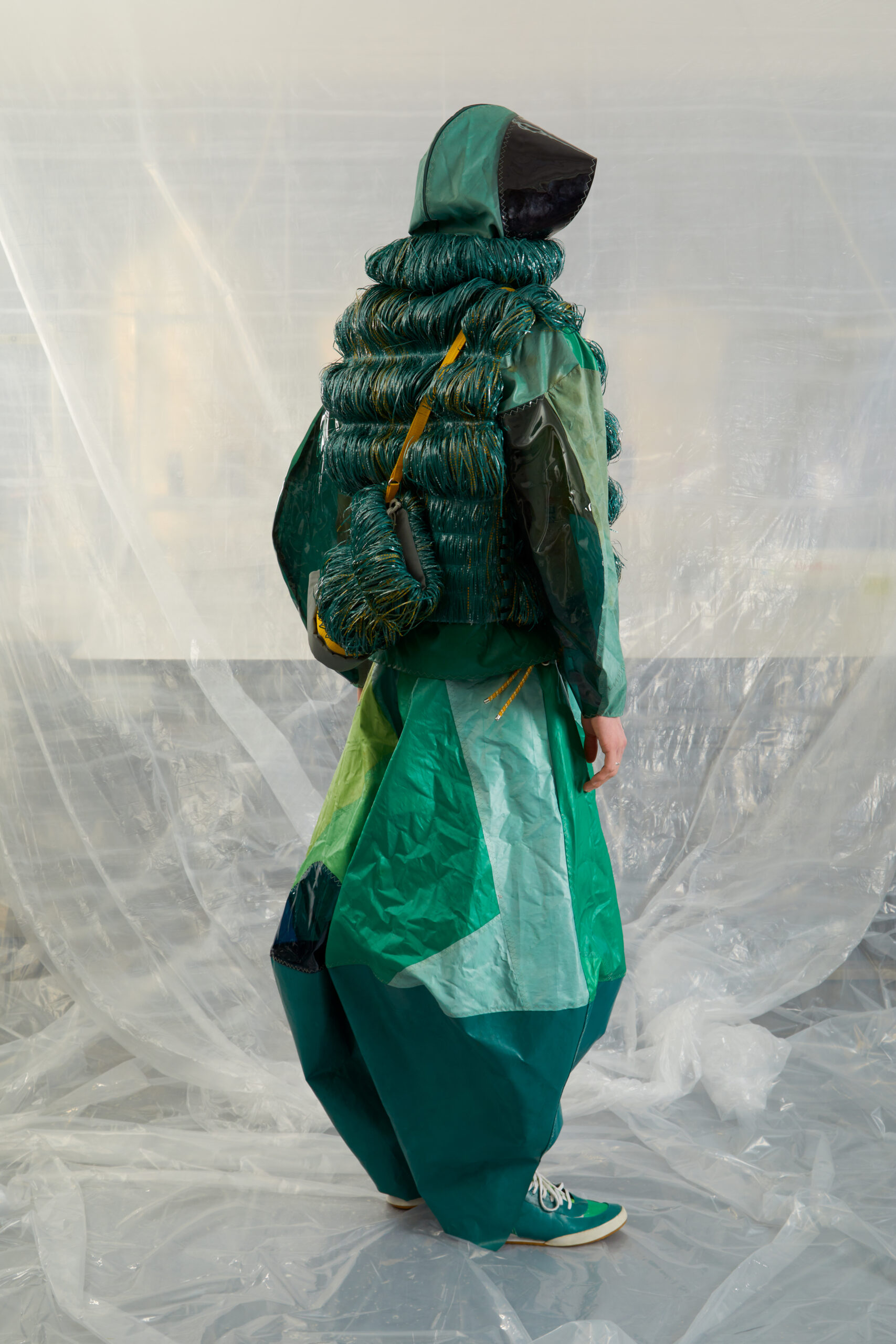
- Filter courses by study level: Undergraduate
- Filter courses by duration: Full time
- Filter courses by start month: September
- Filter courses by subject: Fashion
Fashion BA (Hons)
Let your creativity take flight as you learn the essential creative design and practical skills of the global fashion industry.
-
Visit the Fashion Communication and Promotion BA (Hons) course page
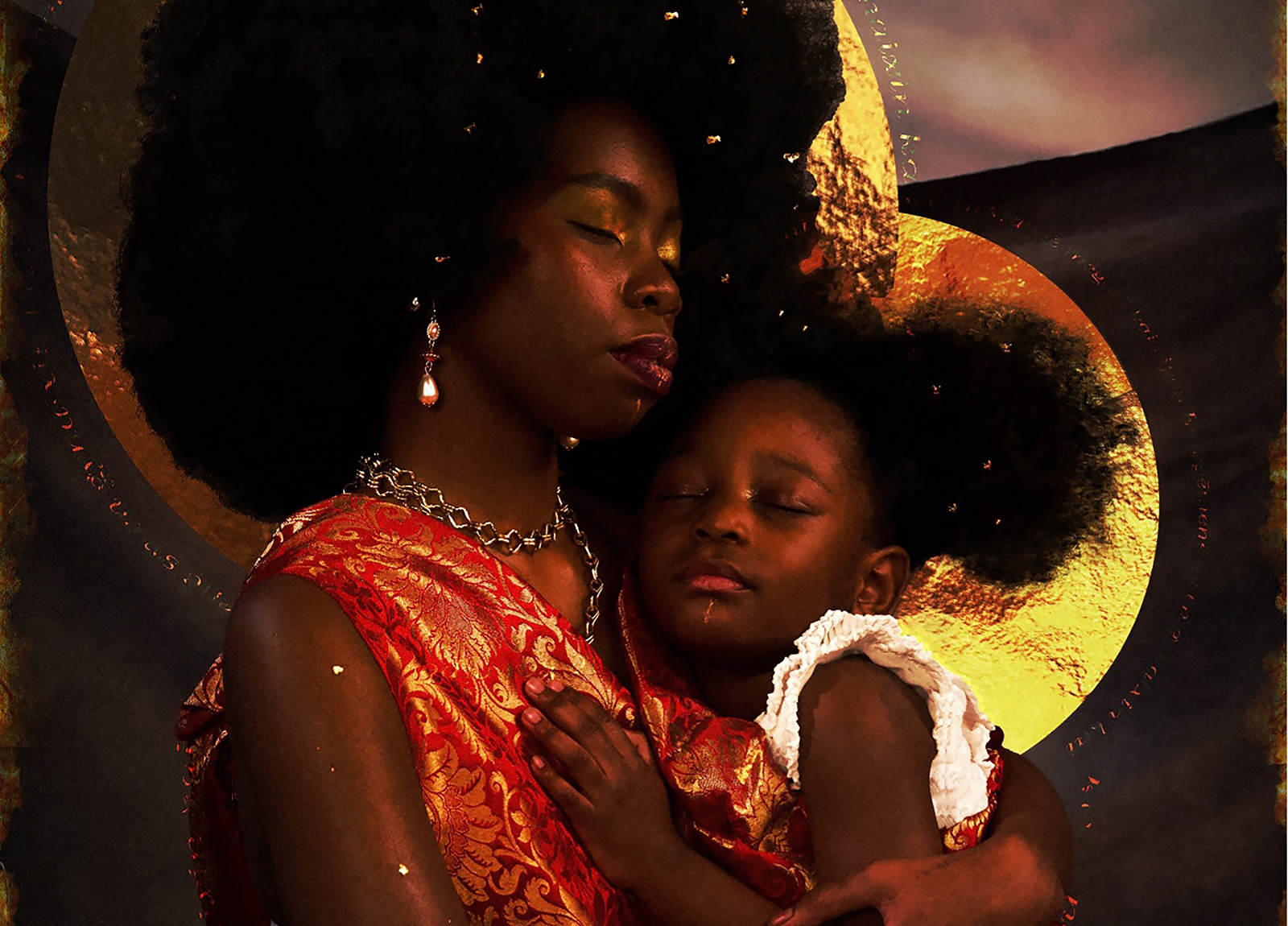
- Filter courses by study level: Undergraduate
- Filter courses by duration: Full time
- Filter courses by start month: September
- Filter courses by subject: Fashion Communication and Promotion
Fashion Communication and Promotion BA (Hons)
Create original content and eye-catching campaigns that mirror the marketing strategies and visual communication skills driving the global fashion industry.
-
Visit the Fine Art BA (Hons) course page
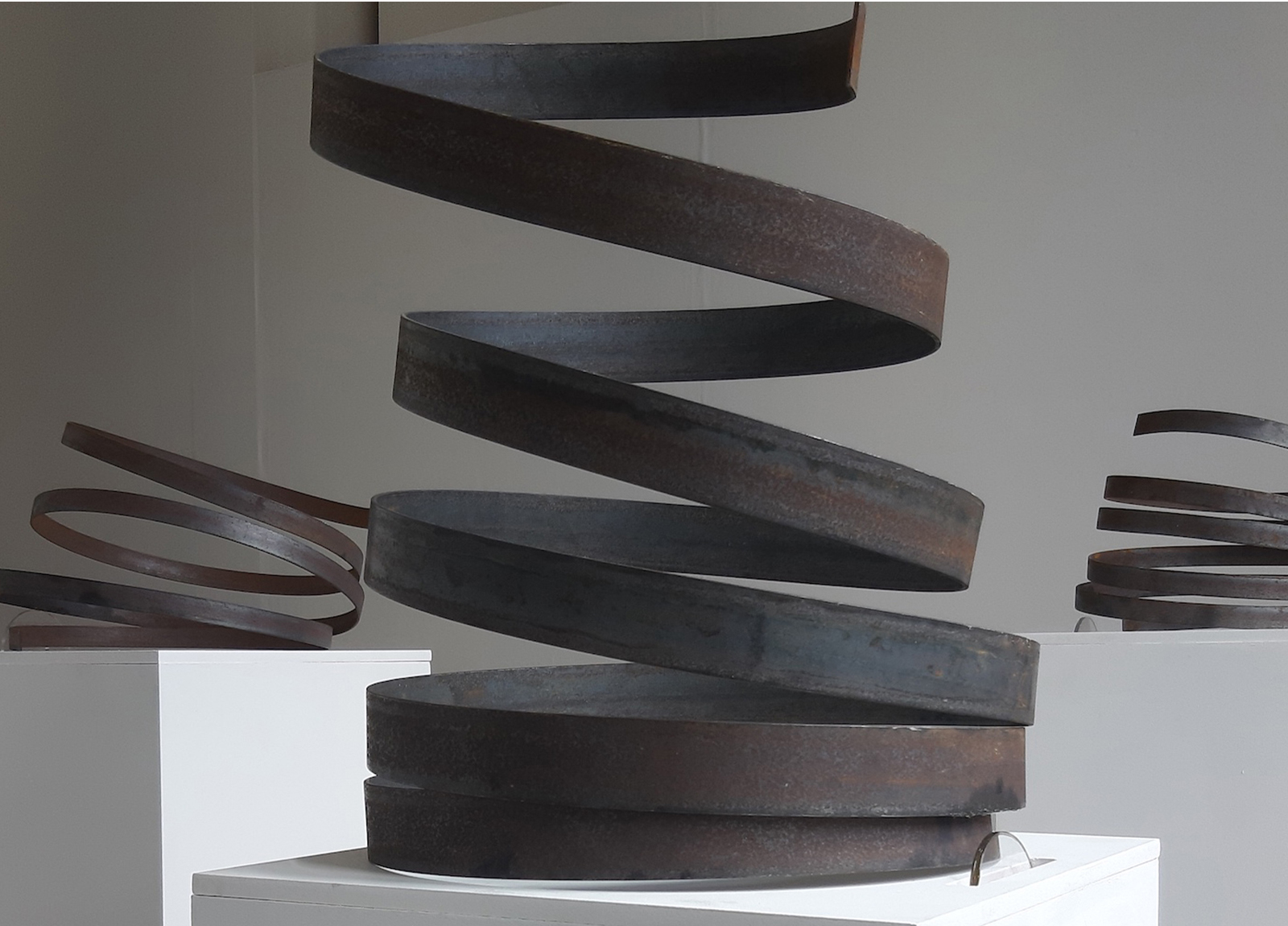
- Filter courses by study level: Undergraduate
- Filter courses by duration: Full time
- Filter courses by start month: September
- Filter courses by subject: Fine Art
Fine Art BA (Hons)
Want to explore your creativity, ideas, and instincts in a vibrant community of artists, thinkers and makers? And shape the future of contemporary art?
norwichuni_textiledesign
-
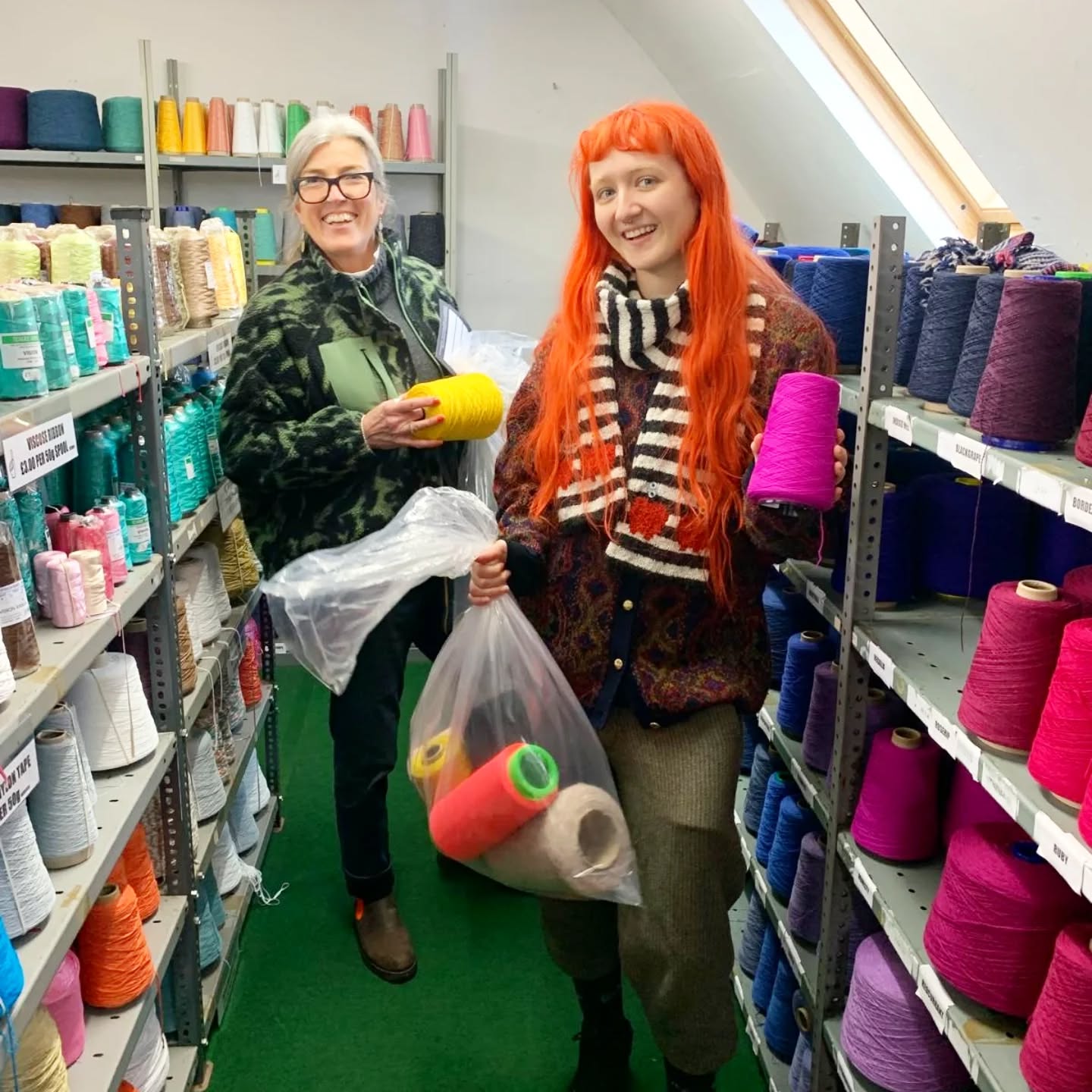
norwichuni_textiledesign Today we have had our annual yarn sourcing trip to Uppingham and we can’t wait to see what comes back and what gets made! Thanks to Nick @uppinghamyarnsltd for supporting the visit, and for Caroline and David for joining in! (opens in a new window)
-
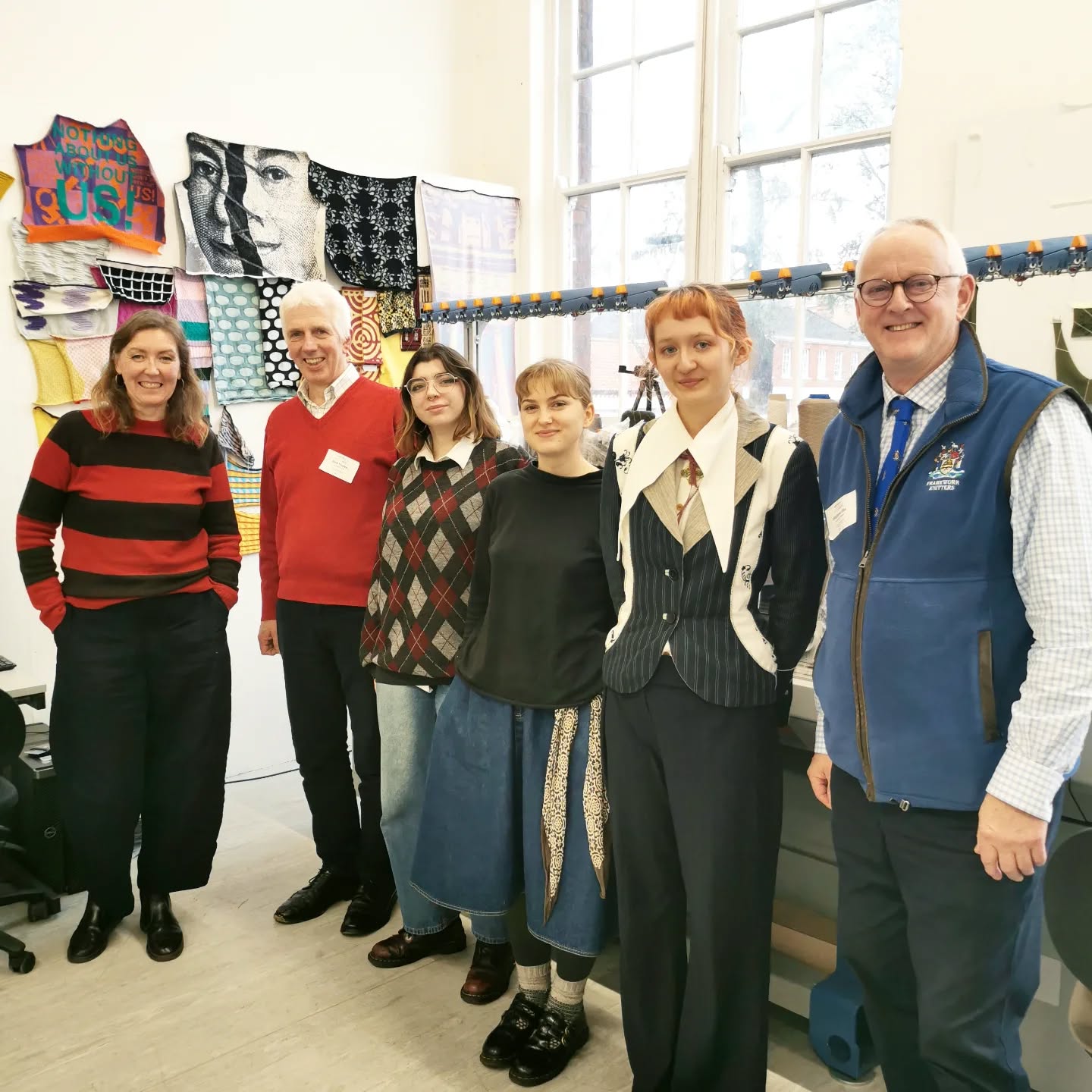
norwichuni_textiledesign Happy New Year to you all! We are two days into the new term, and have kicked our Industry Week off with brilliant sessions across all year groups sharing industry research and careers ambitions. We ran out of time last year to share pictures of three of our BA3 group on their interview day with the Worshipful Company of Framework Knitters @wcfknitters. Madeline, Elena and Sinead have applied for the bursaries available to support final year knit students. They are accompanied here by Senior Lecturer Caroline George and judges Matthew and Nick. Matthew Ellis, a member of the Education committee gave us the following write up: Nick Traylen and I were delighted to visit Norwich University to interview three students, Madeline, Elena and Sinead for The Bursary Award scheme. The Committee visit 25 Universities around the country interviewing 60-70 students for Bursaries, Awards and practical training with either Stoll or Shima. We were not disappointed with the standard of the three students we interviewed, the quality of students from Norwich tutored by Kate Farley and Caroline George always inspires us. Well done team Norwich! (opens in a new window)
-
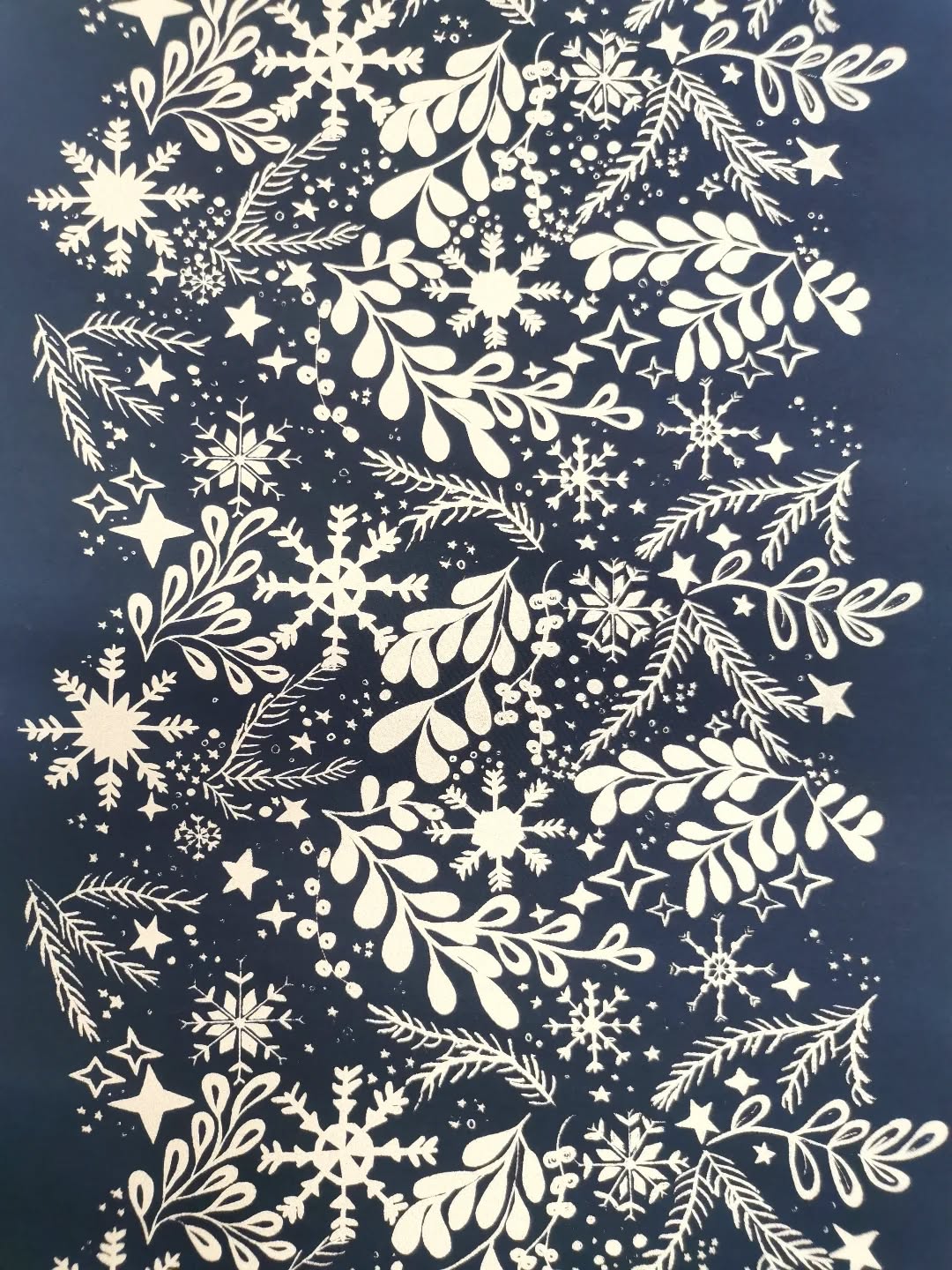
norwichuni_textiledesign SEASON’S GREETINGS to you all. After today we are signing out for the holidays, and we will be back in the new year for more textile design fun! 🎉 🎄 This hand screen printed design was created by @yasmine_carpenter, print technician extraordinaire… Thanks Yasmine! (opens in a new window)
-

norwichuni_textiledesign Last week we ended the term with a design and print challenge for BA3 with Course Leader @katefarleyprint and technician @yasmine_carpenter – we are so pleased with the outcome after a fun session in the print workshop In three hours the design was created, put in repeat, and the screen artwork prepared. The following day, with screens exposed, thanks to @neildavison1969, the colours were mixed and printing began. I’m not sure we managed to capture everyone’s designs in the pictures here but the final major projects are definitely underway! There was brilliant teamwork and festive spirits all round. A fabulous result to end the year! Well done all. (opens in a new window)
-
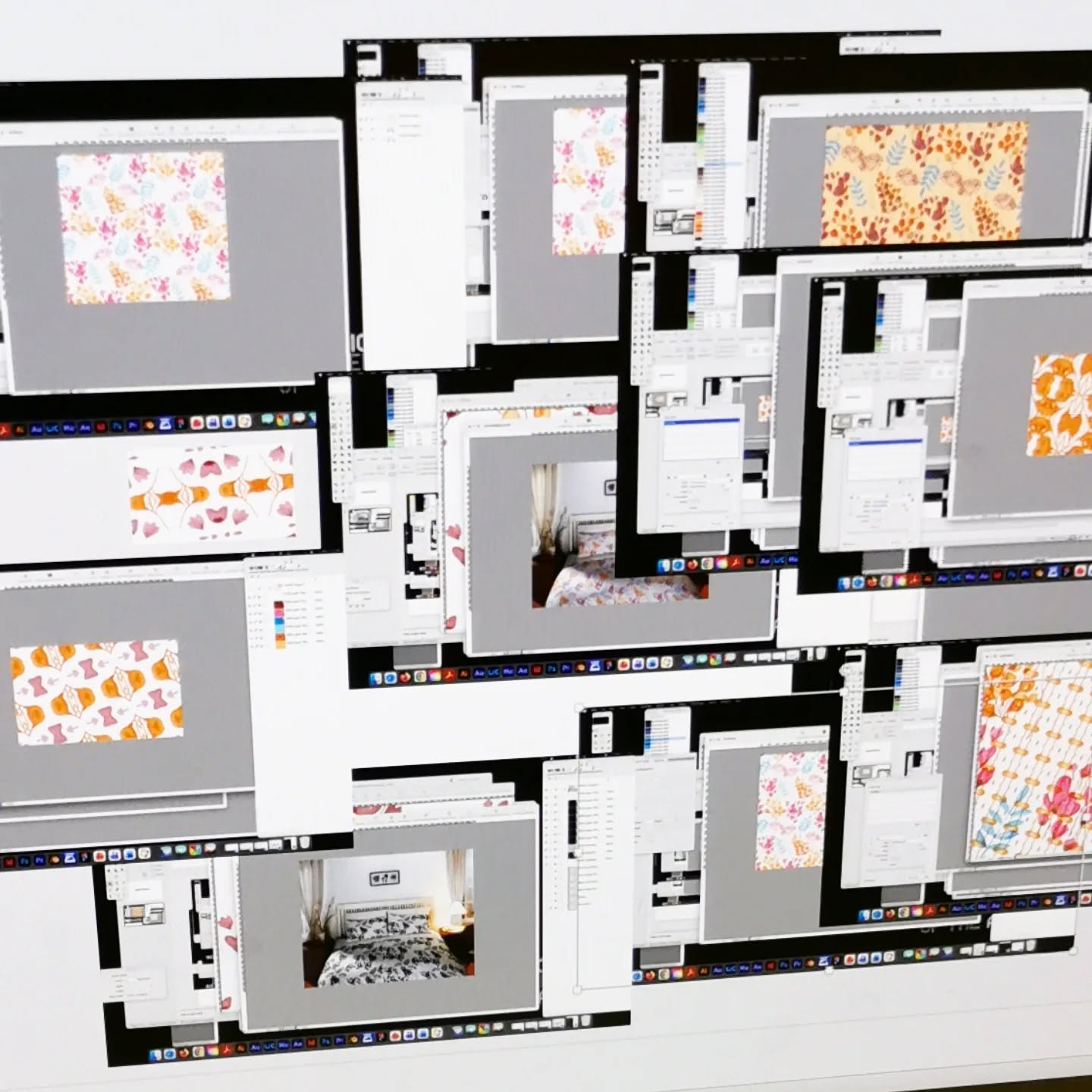
norwichuni_textiledesign Digital design skills are so important for many graduate roles and with our Fashion & Textiles programme CAD suite our students have access to brilliant industry standard software supported by our Design Studio team. Last week we welcomed Sara from @avacadcamgroupltd to campus to teach BA2 and BA3 students the AVA software, excellent for designing repeats, colourways, visualisations and much more! Thanks Sara for guiding us through the software! (opens in a new window)
-

norwichuni_textiledesign This week has seen a new exhibition up in St. George’s featuring BA1 students’ work, selected and curated by our BA3 student group. Initial reviewing and chatting between the two year groups resulted in a strategy to position the work in relation to colour stories, with two striking walls of work representing the first 8 week FUNdamentals project. There were some brilliant leadership skills being displayed, and the technicalities of hanging work considered and developed for further exhibition opportunities coming up. Well done all, it’s great to see personal approaches to textiles already in development! (opens in a new window)
-
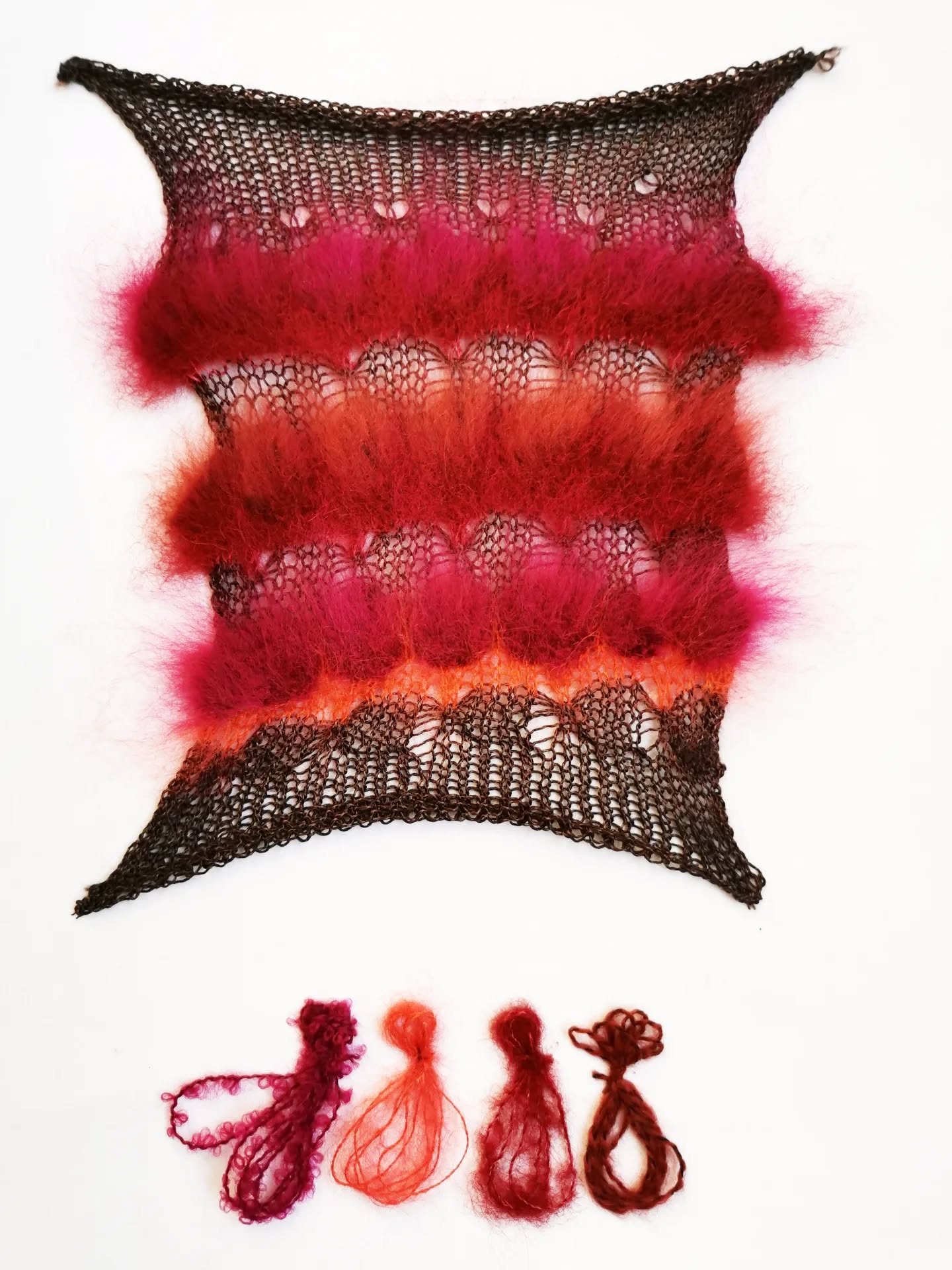
norwichuni_textiledesign In celebration of the @craftscouncil Creative Careers Campaign we are sharing some work by one of our BA3 students Ellie who’s work spans textiles practices including knit, weave, embellishment and print. In her words “A knit collection inspired by my dual Jamaican British heritage. The colours pay homage to the stories of my grandmother growing up in rural Jamaica. The pieces explore feelings of disconnect and loss of my Jamaican heritage growing up in Britain.” As our final year students embark on their Final Projects their attention naturally turns to career choices and preparation for graduation and we will be supporting them on that journey with the help of our @futures_norwichuni team @norwichuniarts #discovercreativecareers #craftcareers #craftcareersday (opens in a new window)
-
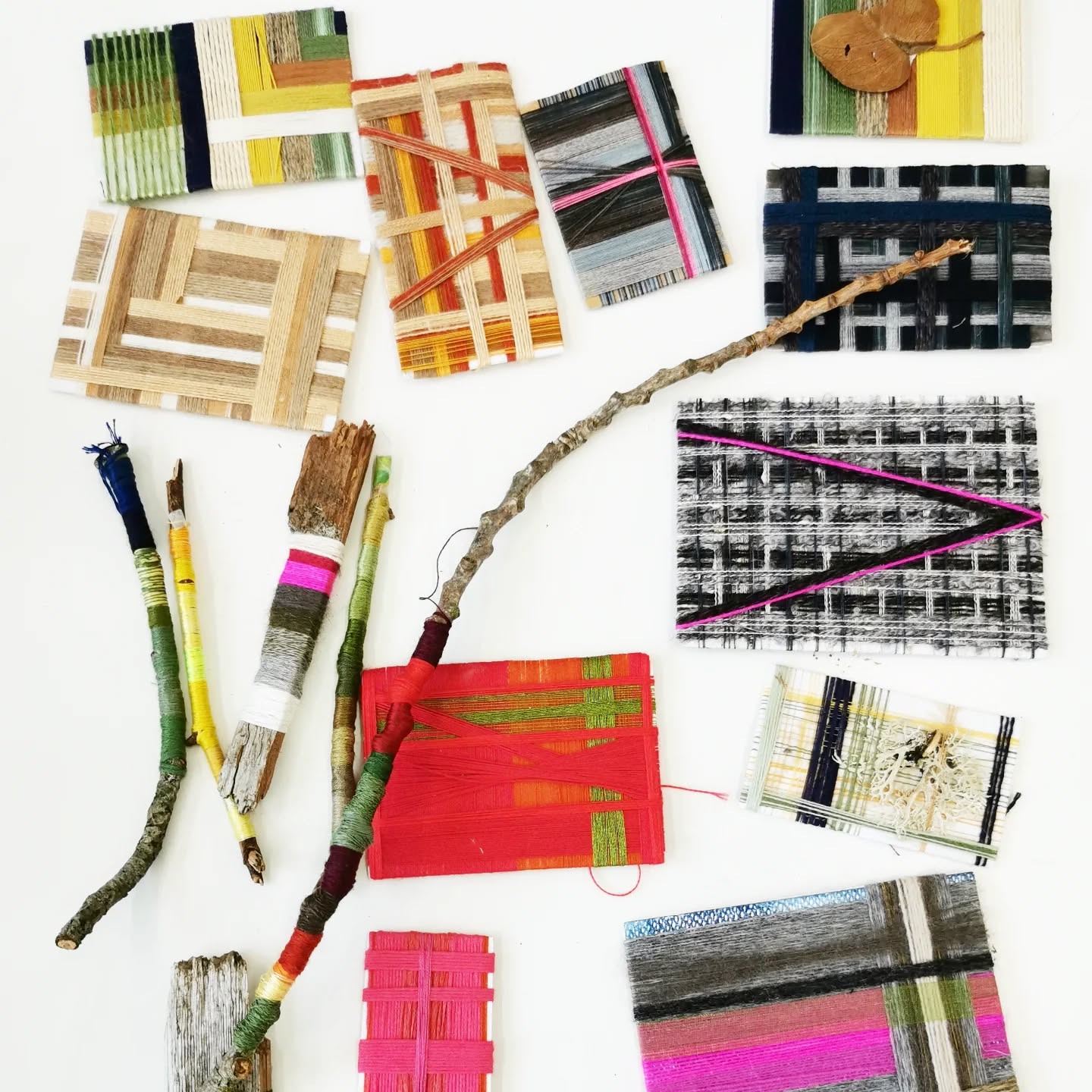
norwichuni_textiledesign We are still feeling the warm glow of sharing our love of textiles, following Interchange workshops last week and the Open Day on Saturday. Thank you to everyone for keeping spirits high despite the heavy rain on the tour! We ended Interchange week with three more workshops, one led by BA2 student @sweffling_designs spreading her passion for yarn wraps (1st 5 pics). It’s exciting to see how students from other courses interpret the process. Well done Sharon for being brave and leading the workshop (& for sharing the amazing chocolate brownies)! The other two workshops were led by Textile Design academic and practitioner @lizziekimbley, one workshop on cordage making and one on net making, with fantastic results in each session. Thanks to everyone who participated in all our workshops! (opens in a new window)
-
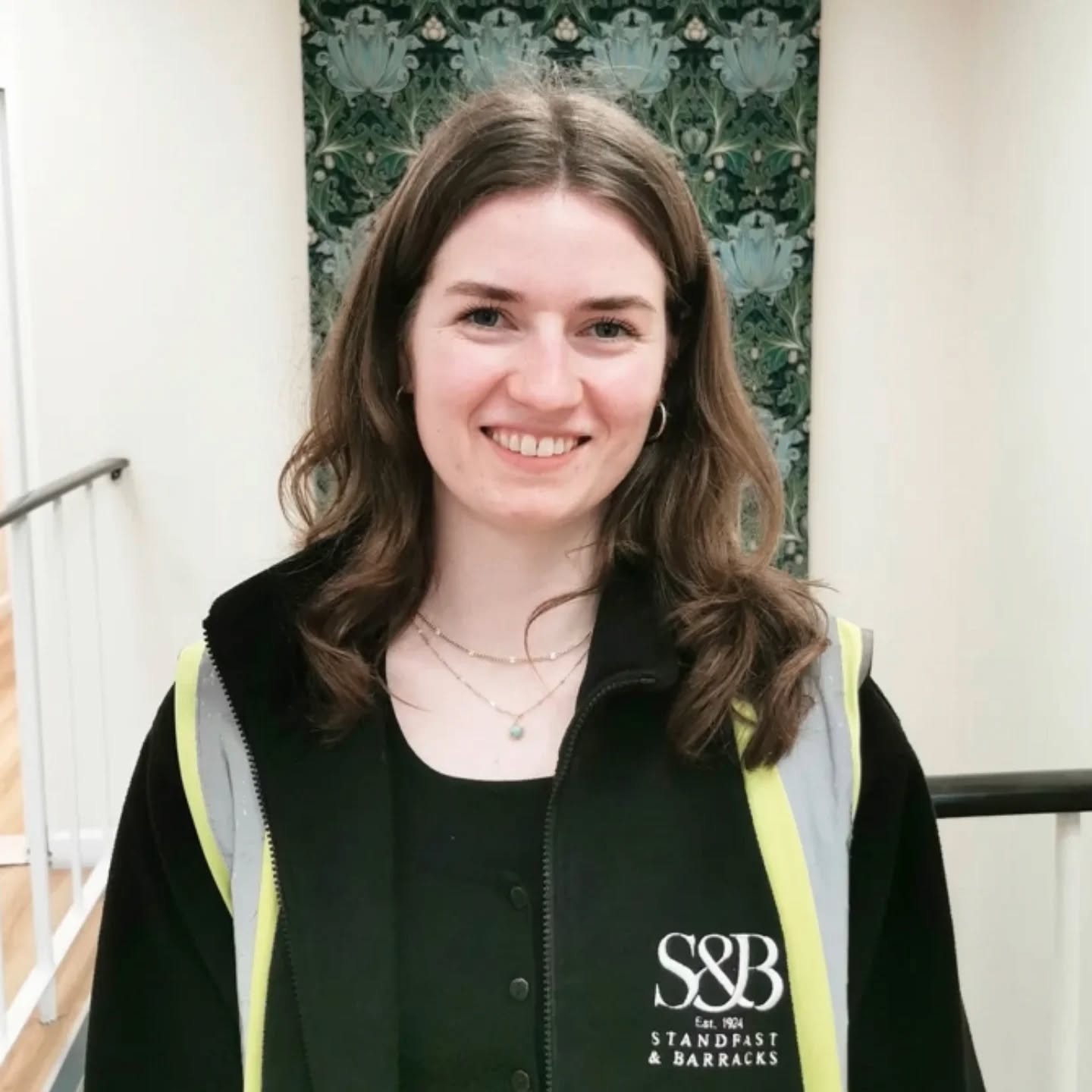
norwichuni_textiledesign Yesterday as part of our university @futures_norwichuni and @norwichuni_alumni event series one of our Textile Design alumni Maisie shared her industry experiences on the theme of heritage and technology. @maisielilley_design is a printed textile designer working for @standfastandbarracks for the last four years up in Lancashire, and has taken on several different design roles and responsibilities. It was great to hear her discuss her professional journey, discussing technology and traditional approaches to print production as well as how the heritage of the company and archive designs are used for contemporary patterns. Pictures here include Maisie at work, Maisie’s graduate collection, and a factory picture of the flat bed screen printing Maisie talked about to us. Thank you Maisie for sharing your textiles industry insights! @norwichuniarts #weareNORWICH #teamtextiles (opens in a new window)
-
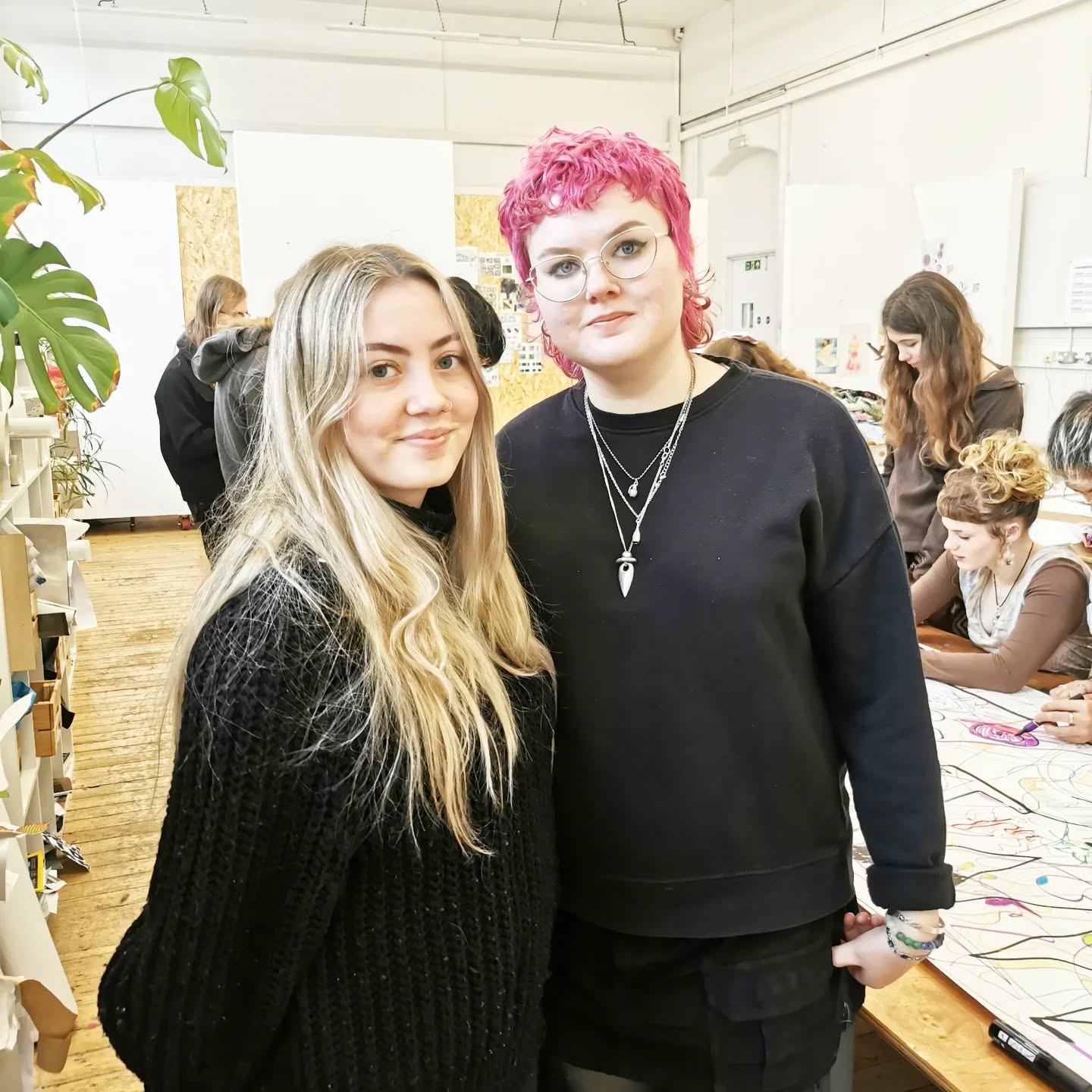
norwichuni_textiledesign Interchange week continues and the Textiles community have been sharing the love for all things textiles and making across the workshops and studios. A huge congratulations to @jj_dahmann and @queenie.textiles BA2 students for running their first student-led workshop titled Make Bad Art. Participants were having great fun playing with drawing in many experimental ways. Thanks to the staff team including Yasmine and David for sharing the love of knit and natural dyeing, Lizzie Kimbley for the basketry workshop and Les and Caroline for the doll making session. Sorry we don’t have images from all the sessions! It’s been great to get feedback from students across the undergraduate and post graduate community – yes we know textiles can be fun, interesting and useful … Maybe we take that for granted sometimes! There are more sessions to come so if you are a @norwichuniarts student get involved! (opens in a new window)
-
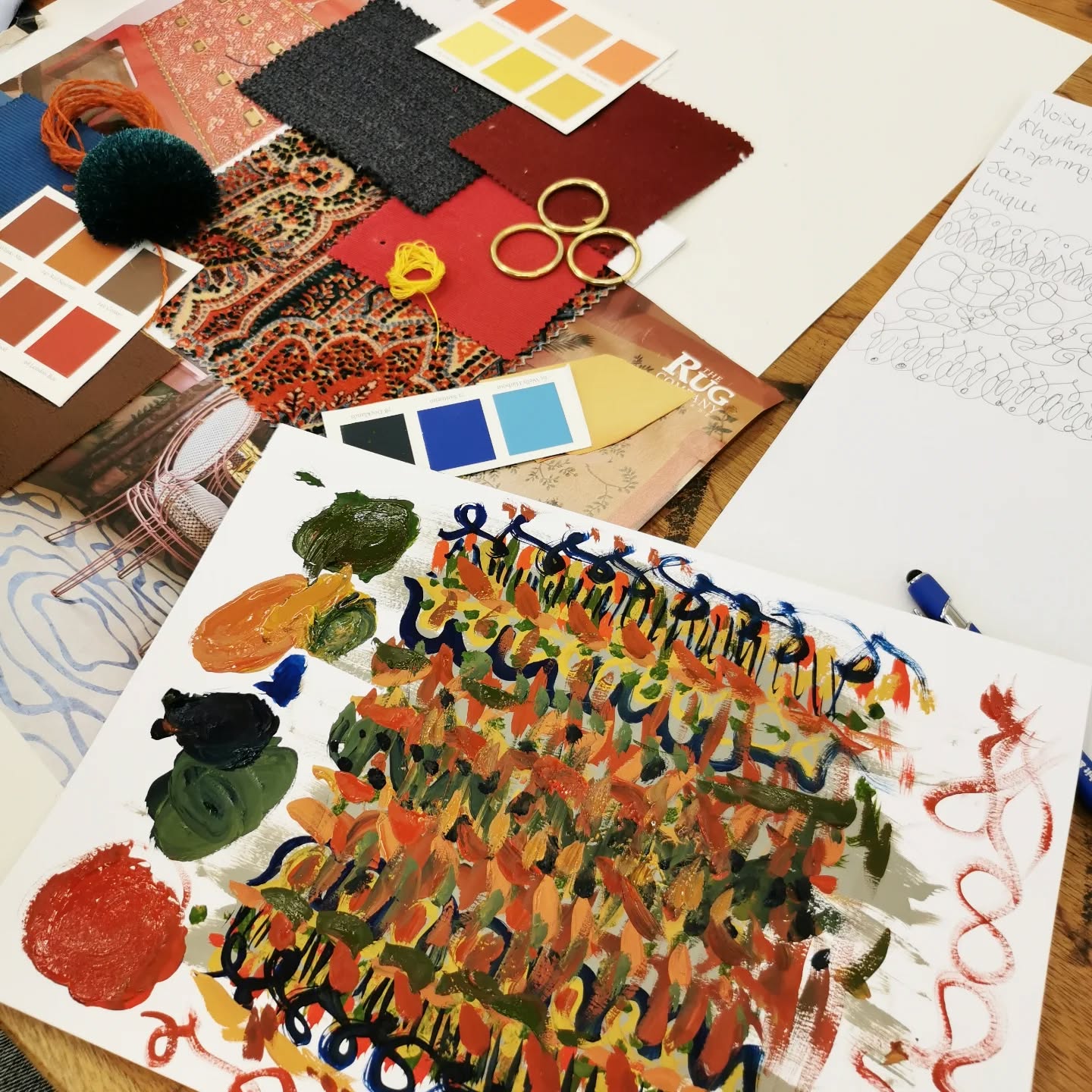
norwichuni_textiledesign In and amongst the assessments the Textile Design staff team have been leading creative workshops for students across the University community as part of our brilliant Interchange programme – two special weeks in the year to build your network and try something different… Pip and Kate led a Colour Material Finish for Interiors workshop, teaching students how to build material palettes for imagined interiors spaces. There were brilliant design boards with hard and soft materials, colour in paint and yarn and pattern elements. It was great to see how students in Fine Art, Illustration, Graphics, Film, Games and Interior Design enjoyed and related to the material challenge. Well done all, it was great fun! (opens in a new window)
-
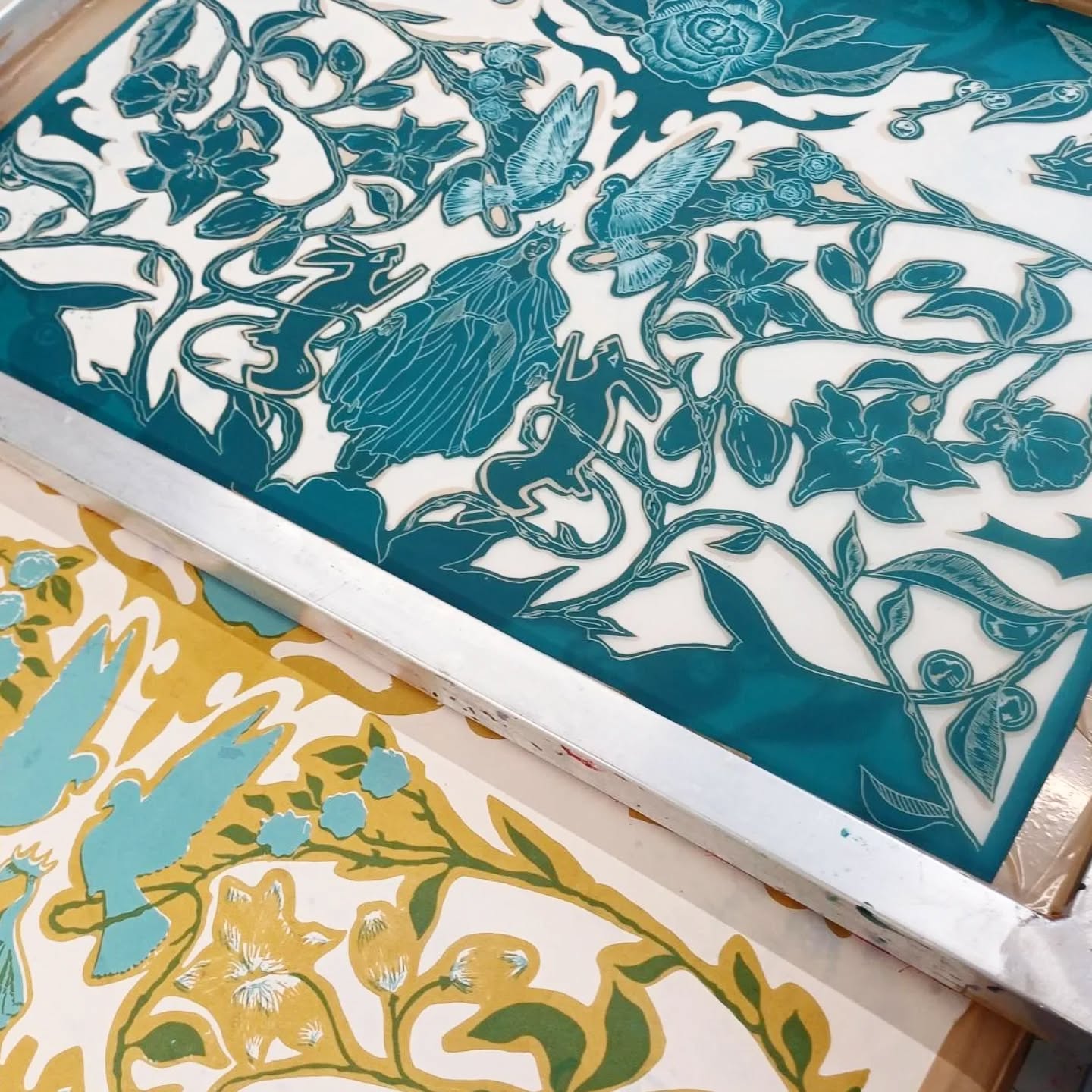
norwichuni_textiledesign The screenprinted repeat lengths are all complete and we are so impressed with the results and teamwork this design challenge required. Well done to our BA2 group! Thanks @yasmine_carpenter for being such an ace technician too! (opens in a new window)
-
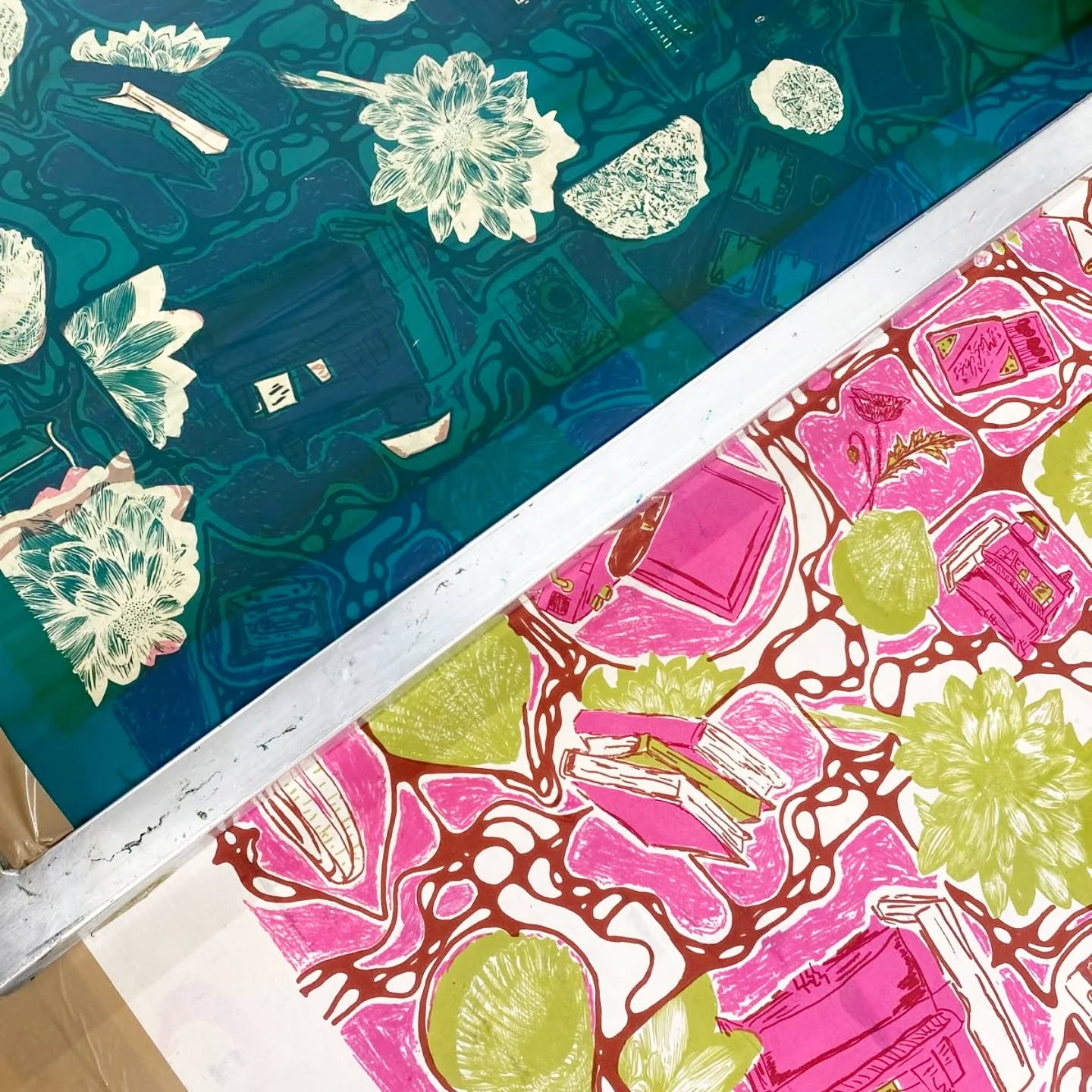
norwichuni_textiledesign WOW!! In a little over two weeks our BA2 students have designed and printed their three-colour repeat lengths in small teams. They have done brilliantly! The students have worked so hard and we are very impressed with the results of the first lengths being screen printed today. We have two more days of printing to go, so we look forward to seeing and sharing those results too! Well done everybody, and a special shout out to our amazing technician @yasmine_carpenter who kept everything on track today. (opens in a new window)
-
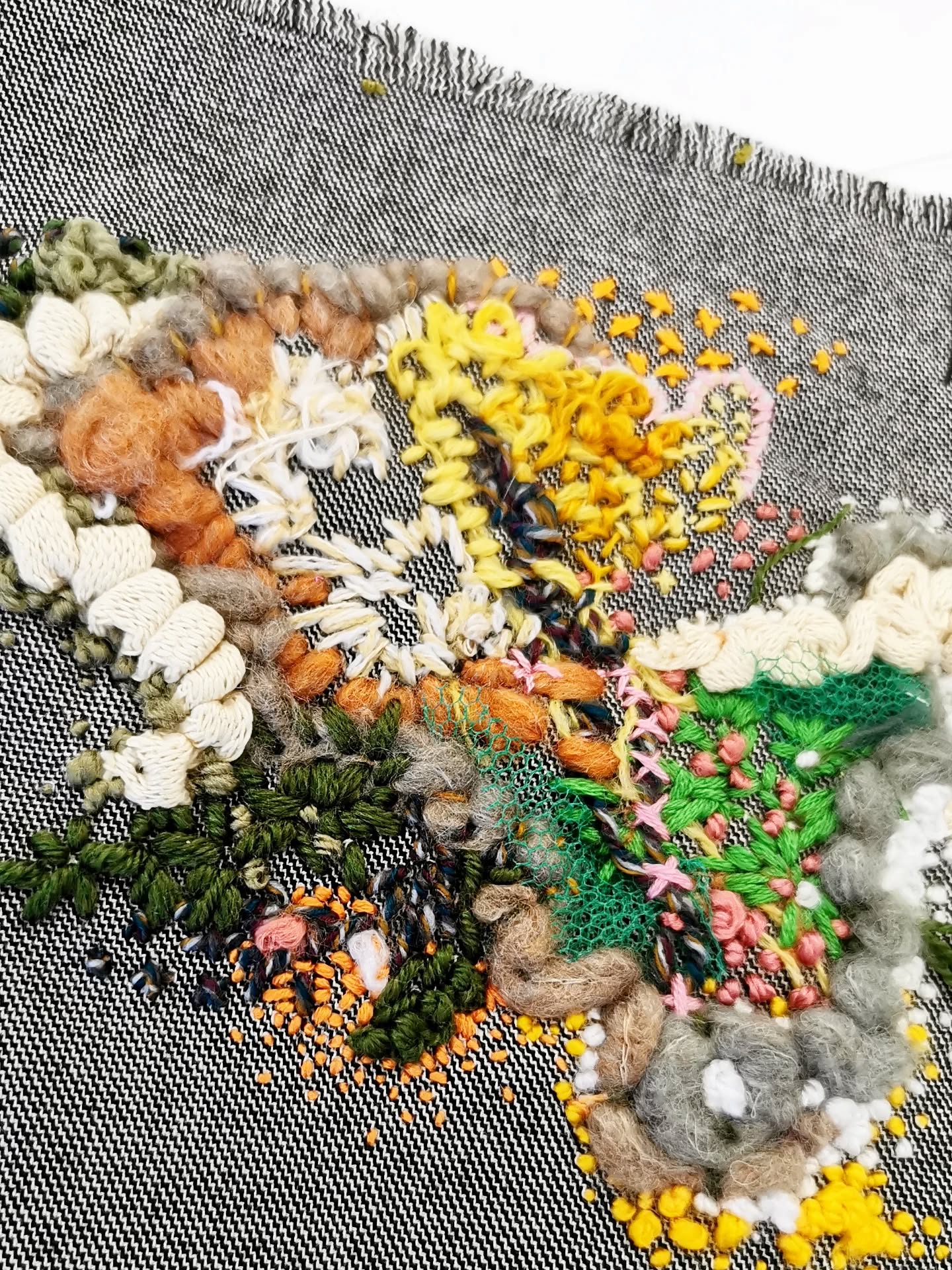
norwichuni_textiledesign We are so impressed by our first year students, they are settling in really well – seven weeks in, preparing for the first assessment point, and the work is looking amazing. The fundamentals of colour, drawing and materials are being explored in such individual ways through a range of technical and academic workshops. Well done all! (opens in a new window)
-
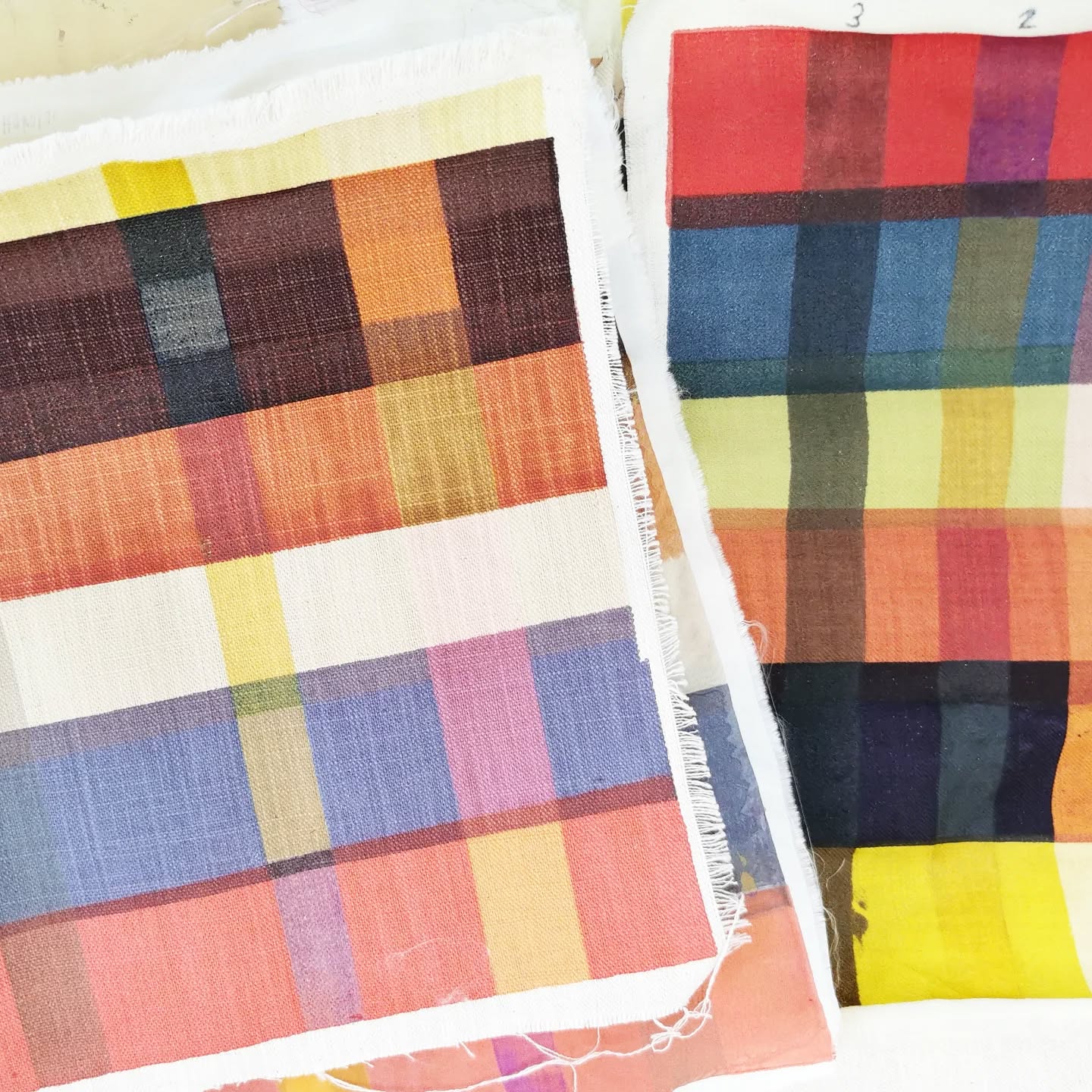
norwichuni_textiledesign Colour … And not just pumpkin yellow! We are celebrating Autumn with beautiful natural colour on cloth. Thank you to our technician @yasmine_carpenter for the brilliant workshop on screen printing with natural dyes. Students and staff have been foraging to create distinctive colour palettes and testing the colours on a range of fabrics. (opens in a new window)
-

norwichuni_textiledesign Brilliant progress today as our BA2 group have been learning about commercial textiles printing, and getting underway with their collaborative repeating length design and print challenge. We have analysed and critiqued previous design examples to understand what they want to do with their designs. There has been lots of talk about material and colour choices as well as repeat pattern structures and motif development. Great work everyone! (opens in a new window)
-
